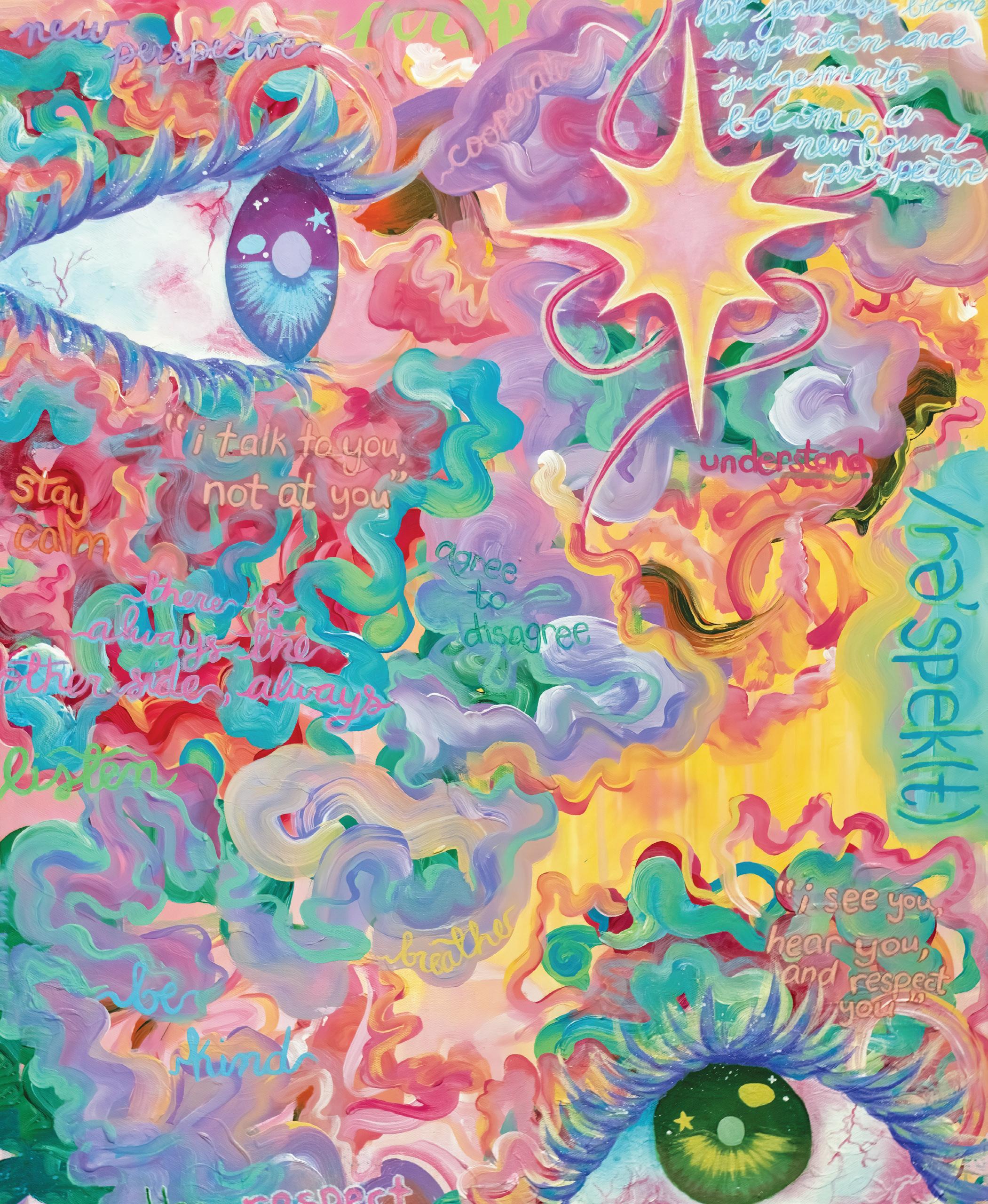

The Glass Knife

eternal giver
by Anika Nadgauda ’26
Ispend a lot of time loving
Because who am I if not an eternal giver
My heart pumping this rare elixir
My hands full with love no matter how much I give out
I pour and pour into those who are in need
But in the dark hours of the night
When even the moon has left me alone
And I can no longer talk to the stars
I glance into my soul
To see if there is any left
And the emptiness stares back at me with a look of disparity
So I start to give less and less
But every night once the moon and stars leave
I find myself with an empty bowl
I am a wanderer giving my life’s energy
To the first who asks for it
Because I know I cannot consume it
My heart gives but does not accept
It reflects but it does not let in
My body withers and wrinkles
And I lay on the floor
Limp and lifeless
Not a single breath
But yet there’s a hole
In my chest
And out pours the love
Because even in death
A giver cannot contain
And a life without love
Is no life at all
So they will visit my body
It will not be cremated or buried
But laid on a display shelf
For them to keep receiving the love
pouring out of me
An eternal producer And eternal giver
Dear Reader,
In the thirteenth edition of The Glass Knife, we present our central theme of sonder, the profound epiphany that every person is leading a rich, complex life like our own, despite our lack of awareness of this fact.
As a result, we have created a volume akin to a museum exhibition for readers to wander through, with each piece offering a glimpse of a lived artistic experience. We include this year’s new “artist spotlight” feature with the goal of offering readers a window into the minds of our artists, who delve into the inspirations and creative processes behind their works. It is our hope that these spotlights will further The Glass Knife’s mission to celebrate art in its various forms by strengthening the relationship between the artist and viewer and highlighting the use of different mediums as modes of storytelling.
Each selection in this volume represents a tile in the mosaic of the human experience. We hope that this exhibition will allow readers to perceive fragments of others’ lives while examining how these pieces reflect a common thread in our experiences. We believe that the artistic experience mirrors the human experience — just as our lives exist in a myriad of complex, individual forms, so do the infinite paths that lead artists to create.
After all, what is the purpose of art if not to unite us through the unique lens of another?
Sincerely,
Lauren Lu ’24, Literary Editor
Claire Gemmell ’26, Art Editor
Grace Zhao ’24, Managing Editor
Siri Atluri ’24, Production Editor
Jewel Tones
by Mia Crowder ’24
Mobile camera
Literary Art
you’re like the beautiful classical music i listen to at 3 am
Romantic
Mariposas
pretty thoughts leap off the paper
Off to Sea
The Memories We Hold
Sahana
My Apple Pie
Childhood Home
Don't Look Up
It's over.
Out in Texas
Last Repast
Maya Angelou
What You Think
I am the leftovers
Prodigy
What They Taught Her
Paris
the powdered chrysanthemum
Night
The Breaking Banquet
Cover: Dreamer’s Spectacle, Katie Espinoza
Inside, front: eternal giver, Anika Nadgauda
Inside, back: Egret in the Forest, Simon Lindenau
Ella Harbart Anonymous
E Robinson
Ella Harbart
Hayley Clark
Irene Jung
Siri Atluri
Ava Levermore
Ash LaPlaca
Kate Barnes
Aaryan Gandhi
Nolan Wilson
Annabelle Do
Priya Chand
Mia Crowder
Mia Crowder & Ju-
liette Zuñiga
Siri Atluri
Nichelle Lindgren
Hayley Clark
Siri Atluri
Matthew Inman
Isaac Reynen
Jewel Tones
Limitless
View from Mt. E’Mei Monastery
Seal on the Kauai Beach
Bed Rot
rusted memory
lilac moss
Storybook Plains
Drifting off
Koi Pond
No Longer Traversing Alone
The Eye
Before I’m gone
Self-portrait
Melting (Take on physical and mental health)
Red Benz
The Future’s Undertow
Erlik Khan are we still friends?
Mia Crowder
Luana Booth
Grace Zhao
Simon Lindenau
Pax Graham
Sylvia Valverde
Katie Espinoza
Chloe Hirahara
Hayley Clark
Katie Espinoza
Mia Crowder
Rya Allen
Gabby Dos Santos
Gonzalez
Ash LaPlaca
Imani Cochran
Simon Lindenau
Sylvia Valverde
Hayley Clark
Katie Espinoza
Katie Espinoza
Kevin Liu
Mia Crowder
Katie Espinoza
Imani Cochran
Katie Espinoza
Ashley Lattyak
Katie Espinoza
Gavin Wang
Claire Gemmell
Graycen MacNeill
Simon Lindenau

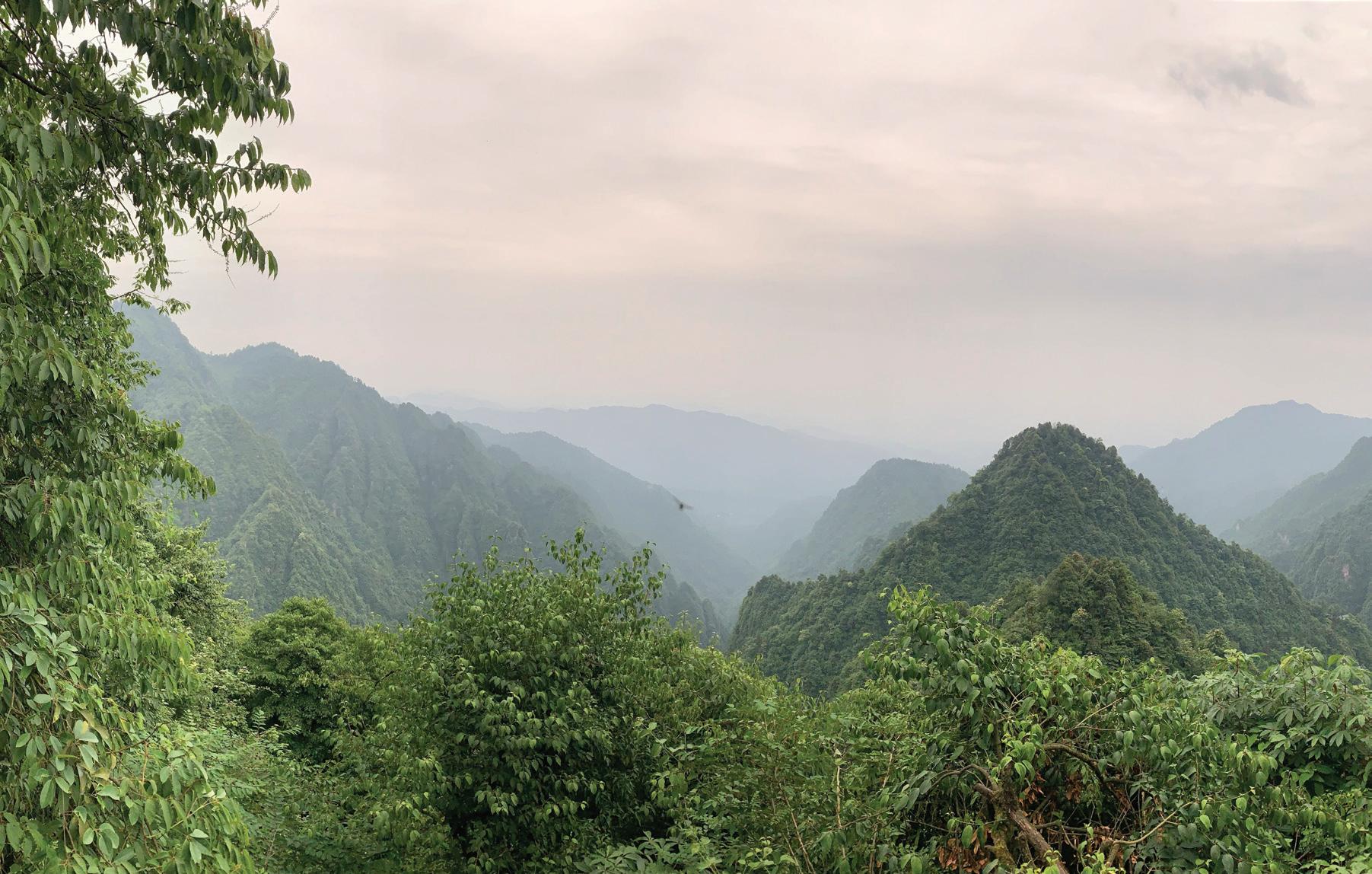
As autumn paints a golden hue a farewell kiss to skies of blue yet memories linger ever strong in the tapestry of life’s sweet song I speak these words so softly to you to see what lie is true for I love the seasons change I so do wish time remains for I get old but my pen stays the same the words I write with my hearts delight
EllaHarbart’26
View from Mt. E’Mei Monastery by Grace Zhao ’24 Mobile camera
Romantic by Anonymous
I’m a romantic. I believe that people are their most limitless, powerful, and authentic when they love.
The first time I fell in love, I was in ninth grade. And in a plot twist I didn’t see coming, I fell in love with another girl.
She really loved music. When she told me that she’d joined the school garage band, I signed up, too. So I, a classical pianist—who’d never listened to Green Day in my life—found myself figuring out how to accompany “Holiday,” “Smells Like Teen Spirit,” and “I Love Rock ‘N Roll.” Not to brag, but … I pulled. (Footnote: We started dating.)
When my girlfriend’s birthday came around, I convinced my mom to take me to three different grocery stores to put together the perfect flower bouquet for a “friend.” After a lengthy deliberation, I finally settled on daisies and pink roses. Then she dumped me. And I’m not going to get into the details, (it was
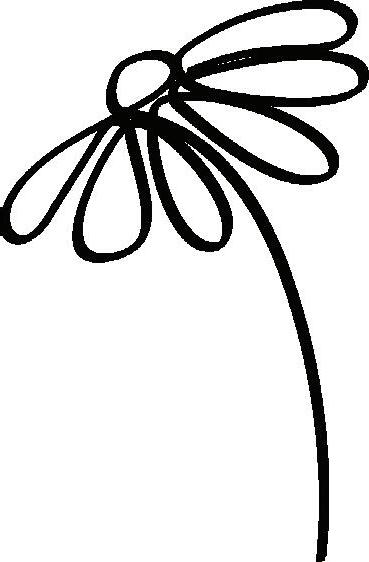
my fault) but man, I was devastated. It really had me like this (wolf). It was bad.
So I went home that night, put “Spring Day” by BTS on repeat, and just sobbed. Eventually I felt like if I didn’t talk to someone, I was going to implode with the weight of carrying this loss alone. I needed to feel seen. But the problem was: Who to talk to?
You see, at that point in my life I was new to this school and not close enough with my new friends to cold call them sobbing at 9 PM. I had no siblings, my mom was hardcore religious, and my dad was not religious but was a very traditional, conservative Asian father.
Pretty terrible options, aren’t they? But the urge to feel seen and heard was irrepressible. So I had to take a gamble. I picked my dad.
I remember he was reading in the big armchair next to the window in the master bedroom.
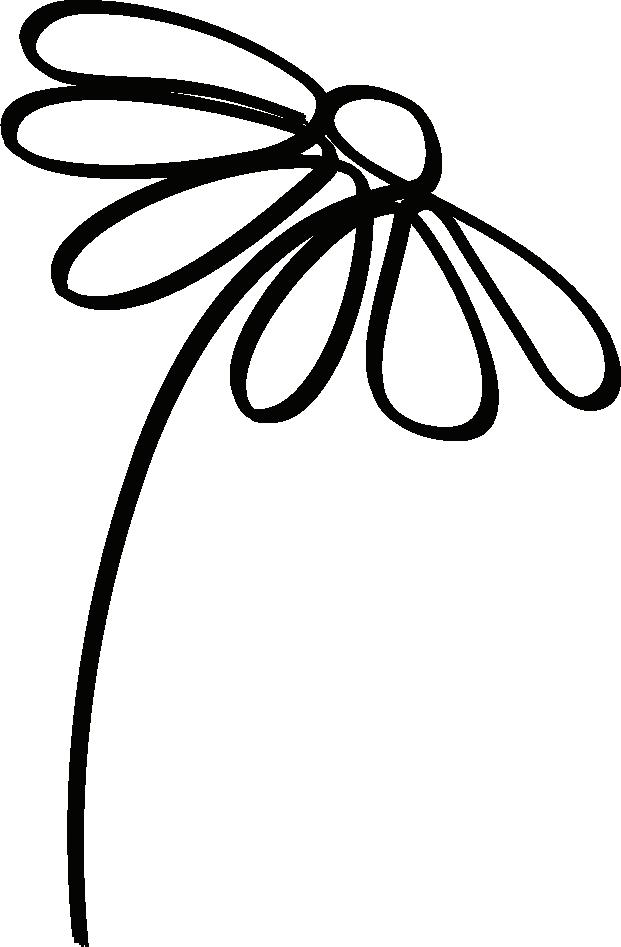
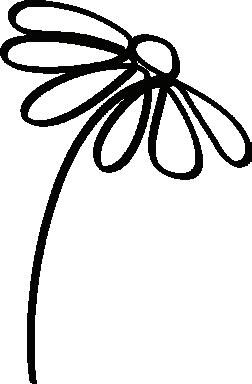
Now I’m going to be honest, I don’t remember what he said. I just remember how it felt. Like I was letting go of the deepest breath that I didn’t know I’d been holding this whole time.
In that second after I came out to my dad, I could see the meaning of my words loading on his face. a chasm And between us, opened.
I walked up to him and said, “Dad, can I talk to you about something?” He put his book down. I said, “I’m bisexual. I just broke up with my girlfriend.”
It felt almost sore—as if a heart that’d been clenched tight this whole time was finally allowed to relax into its true shape. So I got over my ex!
And in a plot twist I didn’t see coming, I’m not attracted to women anymore. I don’t know what happened! I don’t know why the same sex attraction just decided to leave my body, and I don’t know if it’s ever coming back, but that’s the truth of what i feel.
So before I get canceled for “queer baiting,” let me get to the point of why I’m telling this story.
What Queer Love Taught Me
Queer love taught me what it was like to love in spite of everything. To love as instinct. As if one day you looked down and your heart was already taking the reins from your brain, and your hands were already arranging daisies.
But even more miraculously, queer love taught me what it was like to be loved in spite of everything.
It was the chasm of all the prejudices he’d ever heard, all the biases he’d ever held, of the traditional, conservative Asian culture that made up his flesh and blood.
And all I could think was: Could he cross it? Could he leave it all behind for me? Was his love enough?
Well, you already know the answers. I saw him decide it would be enough. I saw him decide to cross that chasm so he could love. And I know, I know, stories about “the power of love” and “forbidden love” are so cliche.
But if you had witnessed love so pure? So radical?
So freeing?
Well, I bet you’d be a romantic too.
Mariposas by E Robinson ’24
Pumpkin, she called me.
I love you, she said.
Sweet Pea, she called me.
I love you, she said.
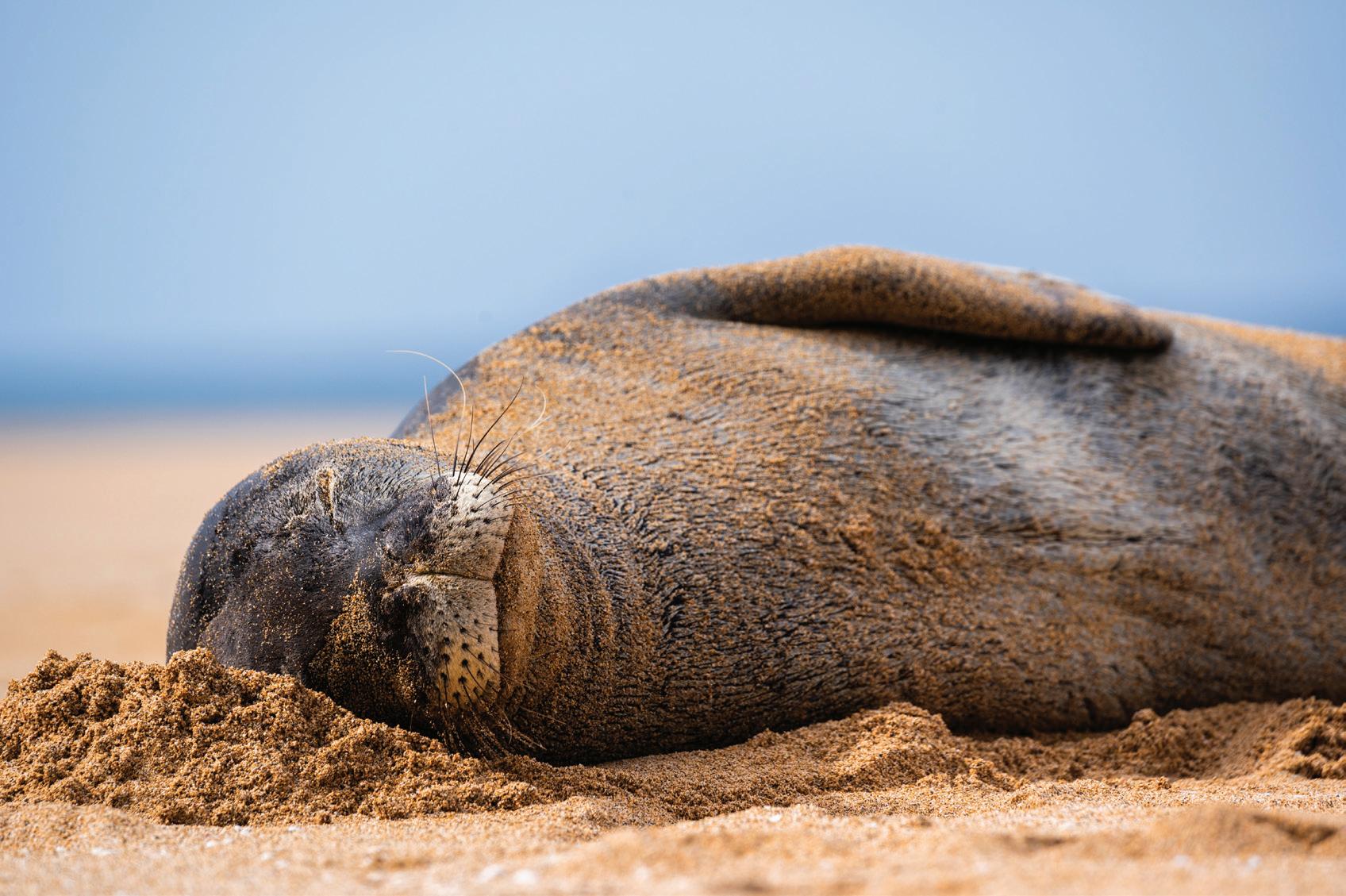
In the hospital, we cried together.
I told her how much I loved her.
We didn’t know that would be the last time.
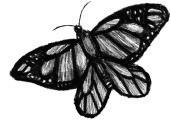
The last time we got to see each other.
I got her a seashell, but she passed. At her funeral, I cried.
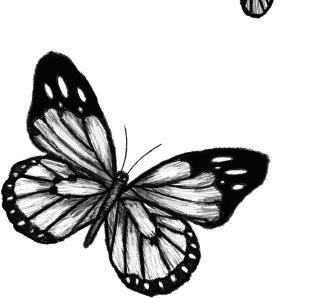
I dropped a beautiful orange flower down on her coffin. Two little butterflies flew over to smell them.
Whenever I see a mariposa, a butterfly, I smile.
I know she is there, watching me grow.
Seal on the Kauai Beach by Simon Lindenau ’25 Nikon z6 with Tamron 100-400mm lens
Bed Rot by Pax Graham ’24
Watercolor
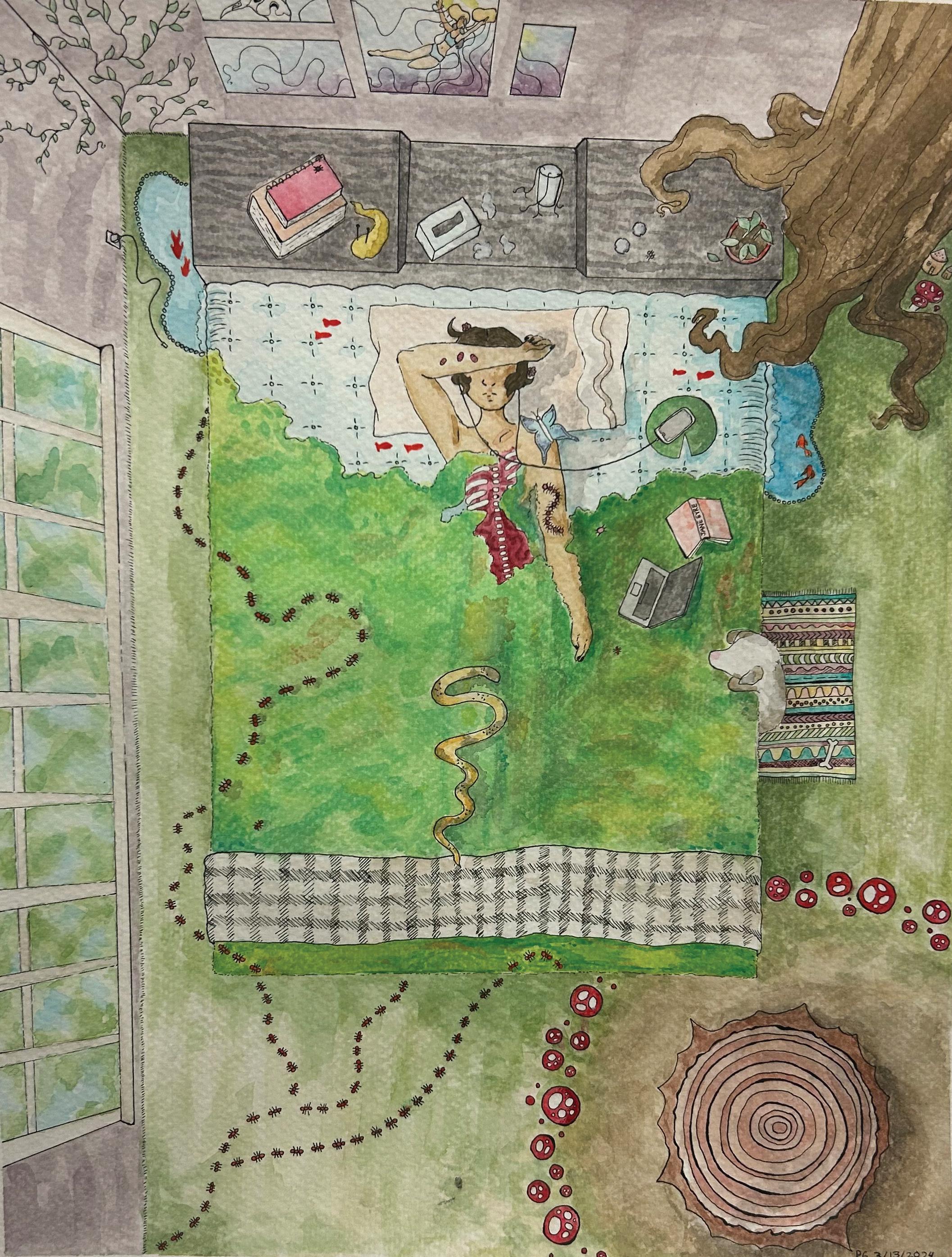
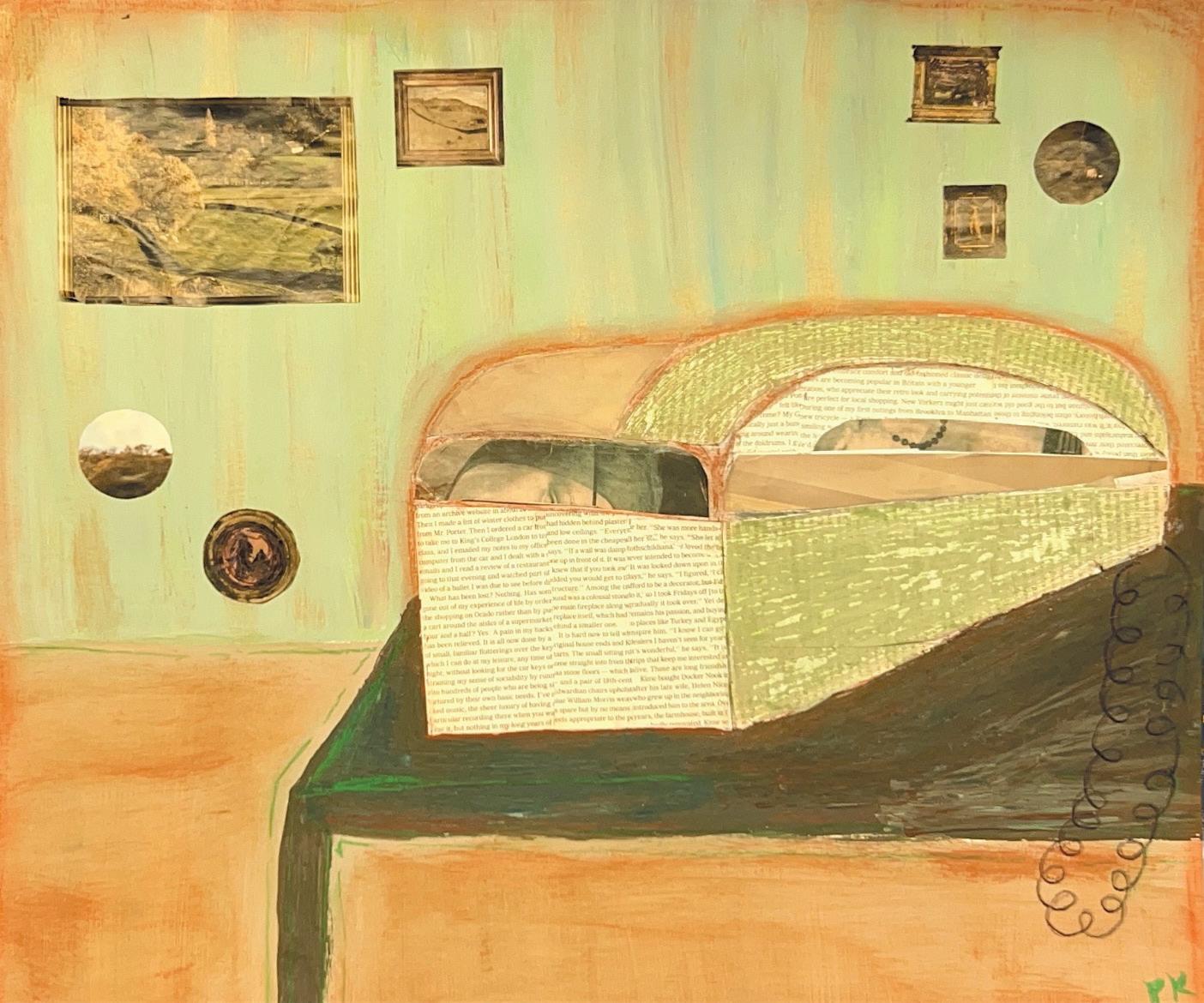
rusted memory by Sylvia Valverde ’24
Acrylic, magazine clippings, charcoal, oil pastels, and marker on poster board
pretty thoughts leap off the paper by Ella Harbart ’26
In the golden rays of sunlight’s embrace a world awakens the wind speaks to me Of dreams and hopes that I seek a dance of stars in the midnight sky their twinkling beauty catches my eye In silent wonders they impart reminding me of love’s sweet art I cherish this fleeting time for in my heart these moments bloom like pretty poems in my room
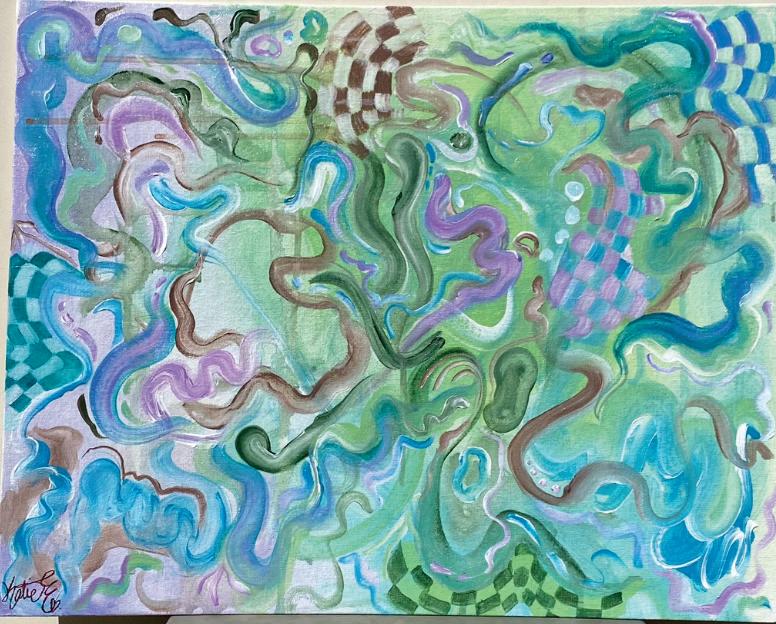
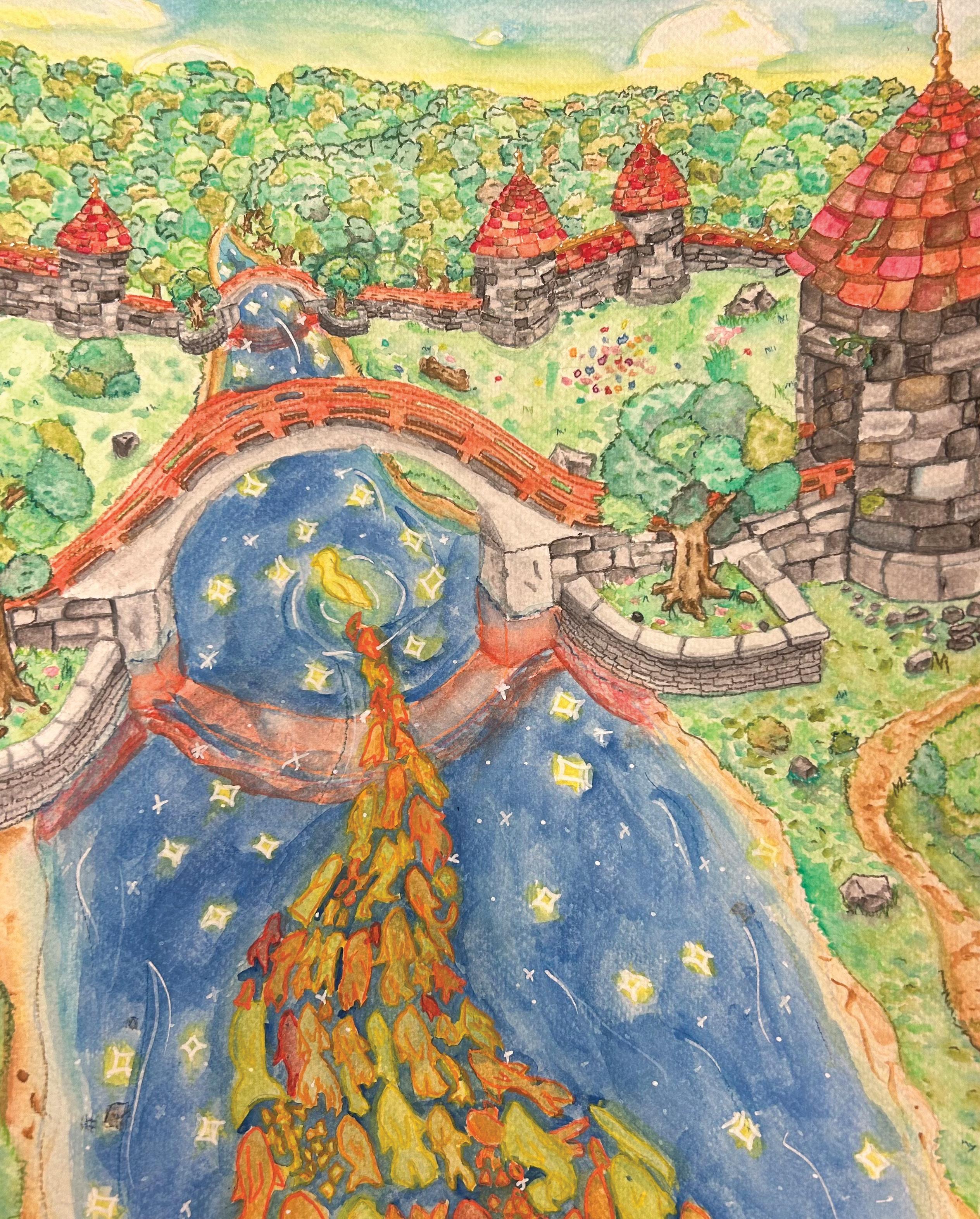
Storybook Plains by Chloe Hirahara ’24
Watercolor and colored pencil
by Katie Espinoza
Acrylic
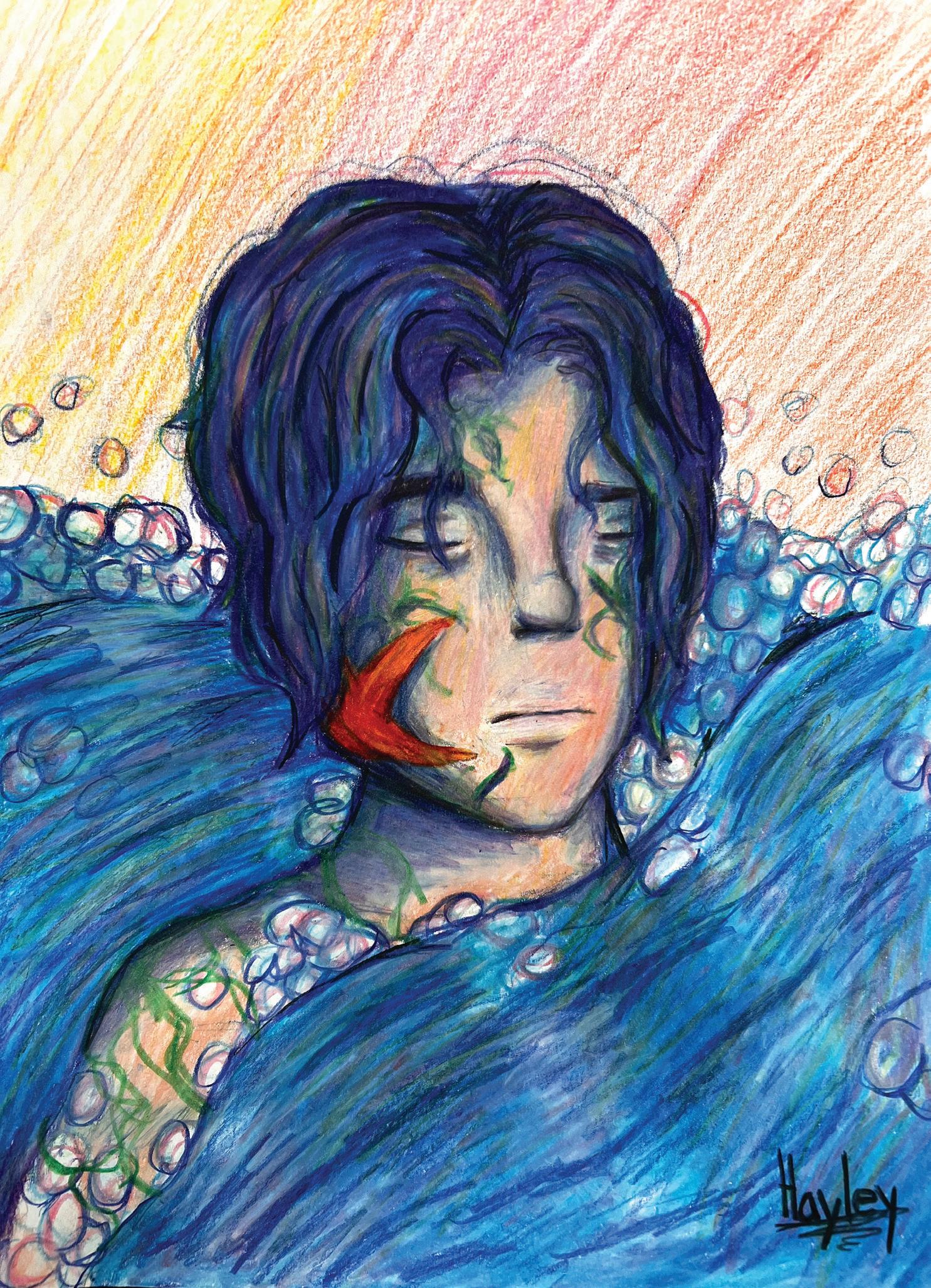
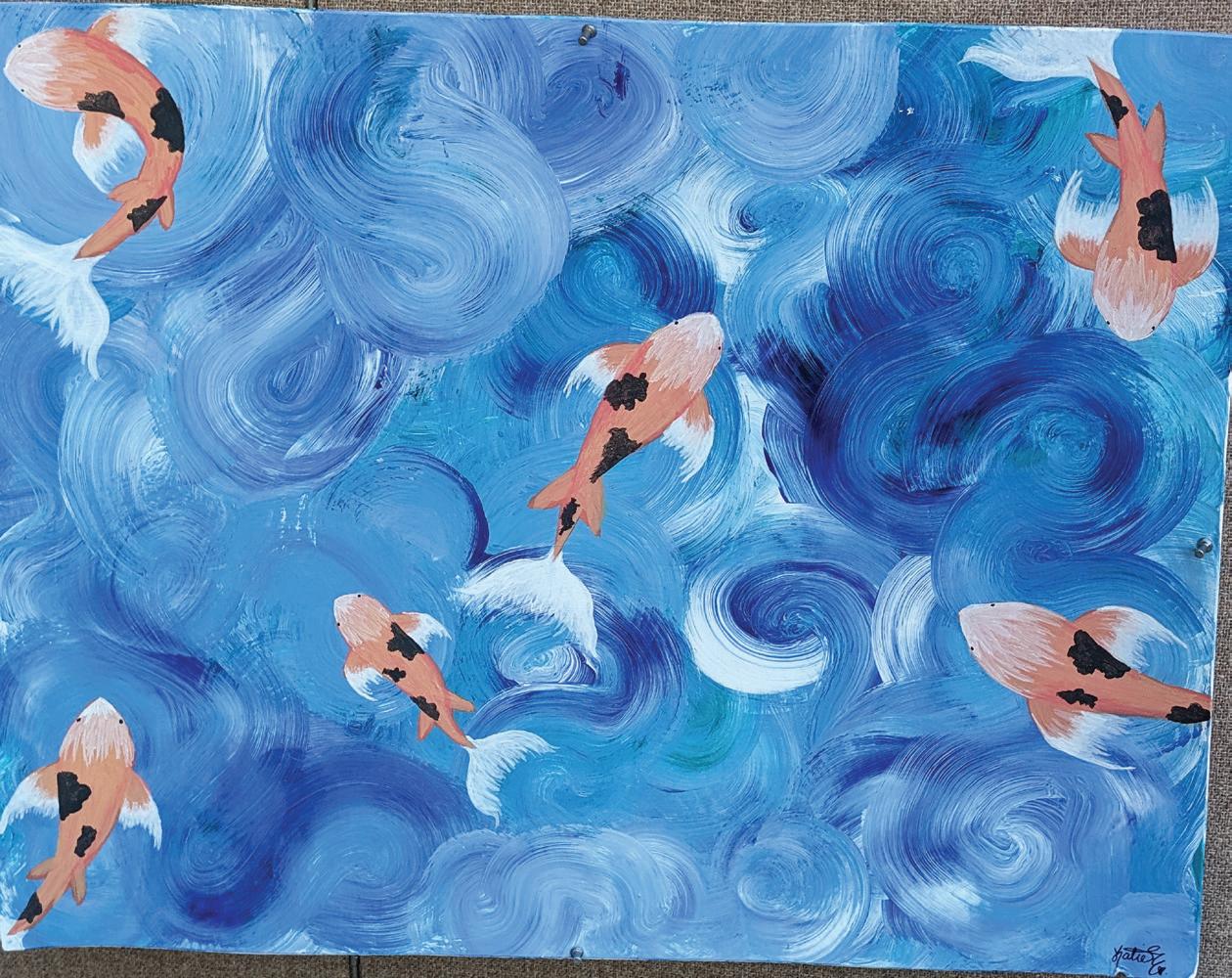
Ithink I might have disappeared I just don’t really get anyone here Everyone’s speaking a language I can’t understand
You’re from Venus and I’m from Saturn We wear the same dress in different patterns
And maybe you’re the reason I’m not talking
I’m drifting off to sea
Nobody gets me
And I have more fun with the people you don’t like
Cause they’re not “on your level”
There’s so much more in the world
But we discuss the same three things And it’s always Pushing, pulling, there’s no more space Someone smeared my life all over the place
And there’s always a little too much weight on my back
Always a little too much on my plate
I always am running as fast as I can And I always get there a little too late
I’m drifting off to sea
Nobody gets me
I’m drifting off to sea
Nobody gets me
I’m drifting off to sea And nobody gets me
Off to Sea by Hayley Clark ’27
Drifting Off by Hayley Clark ’27 Colored pencil
Koi Pond by Katie Espinoza ’24 Acrylic
Artist Sp otlight
“I wanted to capture within the landscape the fear and anxiety that comes with this time of significant change.”
Mia Crowder’s fantastical, creepy worlds are explorations of dreams and emotion as well as tributes to the beauty of nature.
Plants and insects often appear in her pieces, including No Longer Traversing Alone (p. 19) and Miscellaneous Parts (p. 42).
Crowder often uses art to process her emotions, describing art as “a really great tool for working through difficult situations and heightened feelings” because of its ability to communicate wordlessly.
The emotion that sparked No Longer Traversing Alone was “the fear of moving on in the world as a young adult,” a familiar feeling for graduating seniors like Crowder. She says, “I wanted to capture within the landscape the fear and anxiety that comes with this time of significant change.” Accordingly, the work’s insect subjects are pictured together “to represent the wish to traverse these changes with someone else.”
Crowder typically works with graphite and watercolor, but explored with wire in No Longer Traversing Alone to give her plants “eyelashes,” adding to the work’s macabre tone. She describes her creative process as “going with the flow and seeing where it takes me,” adding that her best pieces result from late night bursts of creative energy.
In No Longer Traversing Alone, look for: The pieces of wire sprouting out of certain plants — a particularly time-consuming detail, according to Crowder.
The Memories We Hold by Irene Jung ’25
Walking in the park together laughing, Enjoying ice cream on the dirty floor, Making those silly mistakes and fighting, Not knowing what would come while we explore.
We may all think we are happy right now, But there will always be times when we’re not. We think “will they leave me somehow?” But never consider “where did they trot?”
We never know when memories will go, It’s best to hold on to what we have now.
Whether it’s friends, family, or a foe, Nothing in our hearts will last anyhow
In our hearts, all our memories will fuss, But in the end they don’t last forever in us.
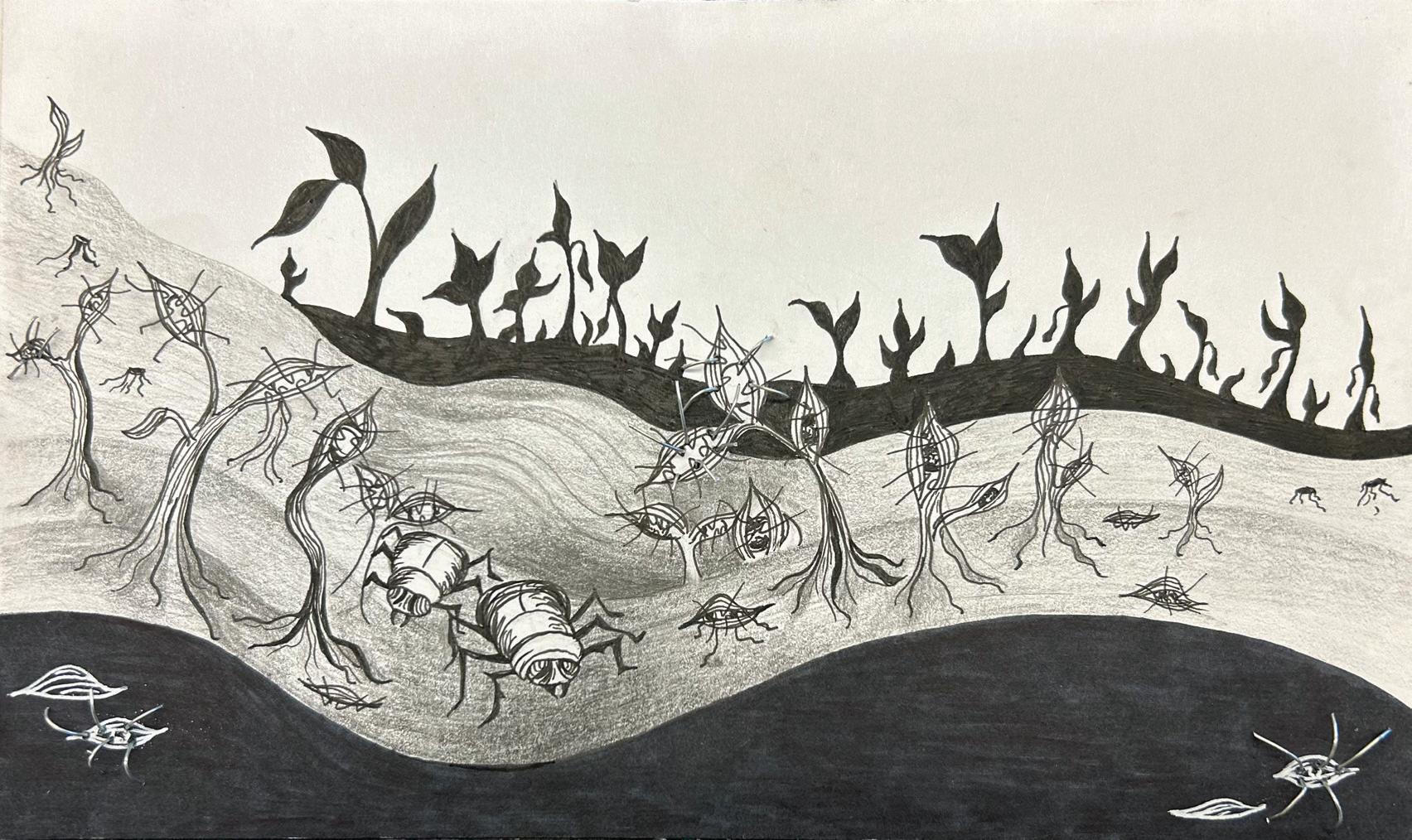
No Longer Traversing Alone by Mia Crowder ’24 Pen, graphite, and wire on poster board
Eye by Rya Allen ’26
Colored pencil
Sahana
by Siri Atluri ’24
Any type of hair on my upper lip feels like needles and I can’t see out of my eyelashes anymore.
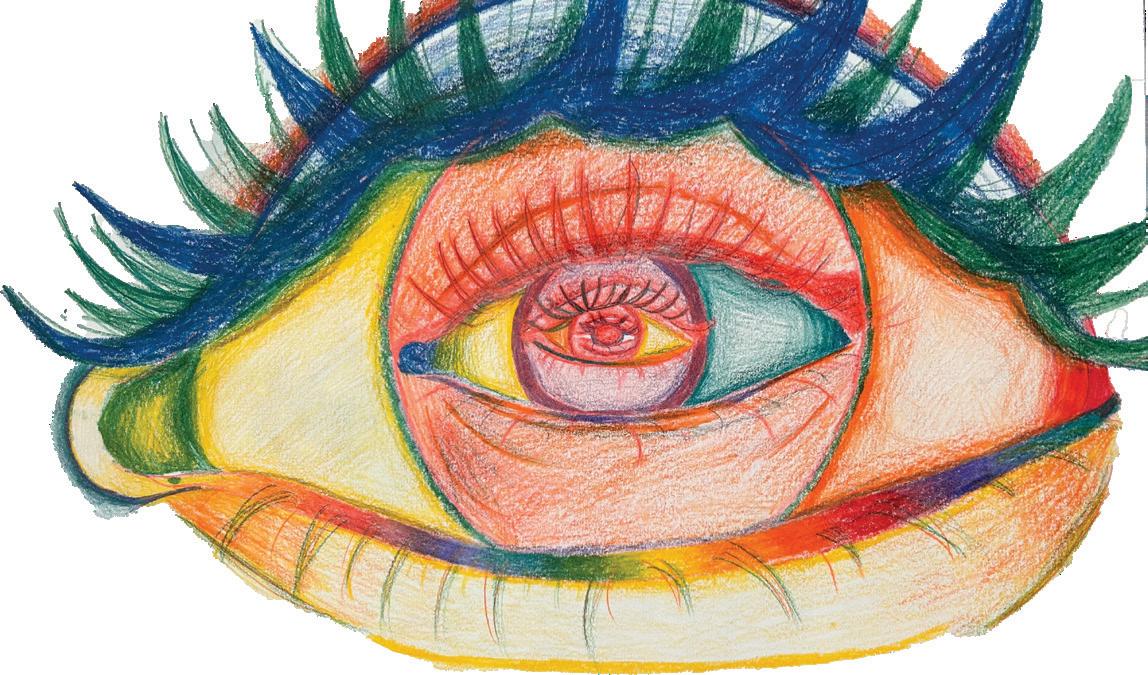
But Sahana, your bright eyes call to him swift under the wind, as the microtones of a veena.
I can’t slick oiled hair in the pockets between braid pleats without the kid creeping up behind, saying it is wily cords, Saying it reminds him of the vegetable oil that pools on the bottom of leftover Tupperware. But Sahana, your fingers grasp each starlet claimed in your bedazzled enclosure Cotton-like, in softness and in strength.
How long can I contain?
How long can I become so out of my world excited that I’ll go to the temple field trip and ring the bell, so maybe they won’t think
I worship rocks anymore?
The same ones they step on in the street?
Sahana, you make it look so easy your billowed pants and your cotton sash
You don’t cry at the Indian words You cry at your recognition smoked kajal tears as light as a jasmine scent.
Sahana, I’m tired.
But tell me to open my eyes
Tell me how you stay ubiquitous
Tell me your serenity
Tell me each and every wonder that you don’t know but just are.
Sahana, all at once you just Are.
Apple
Pie
by Ava Levermore ’26
Pushing and pressing the dough, kneading until it turns tough and feels like the texture of my skin, flour spread all over the countertop and all over me.
From my face to my apron, the dust covered me prettily, just like magic. As I watched Grandma cut the apples with a smile from ear to ear, I sprinkled on cinnamon and brown sugar, adding a lot to make sure it is extra tasty.
With a stern but loving look, Grandma told me, “You put too much,” so I placed the apples in the pan with the dough on top.
the flour around while dancing to the music playing on the radio.
The love that I felt when I baked with Grandma was the most magical feeling in the world.
She slapped my fingers away as I reached into the oven. “It’s not done!” she scolded. I groaned with frustration because the smell was so appealing that all I wanted was a slice to eat. My sister walked in, eager to try a slice from the smell wafting upstairs. I repeated what Grandma told me:
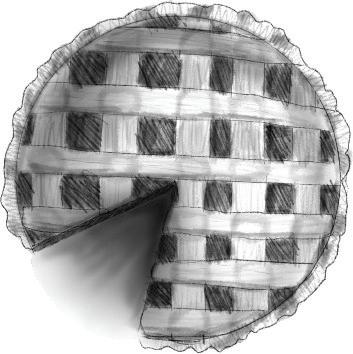
I sculpted my initials out of dough and put the letters on top, proud that Grandma and I created the recipe for the perfect apple pie.
We laughed and giggled as we tossed
“It isn’t done!” Grandma washed the dishes and cleaned up the flour. Once all the flour was gone, the magic felt like it had been placed on pause, time counting down until we got to try the baked good.
Grandma pulled the pie out of the oven, golden like a star, and bringing my fork to my lips, I tasted my apple pie.
My
The
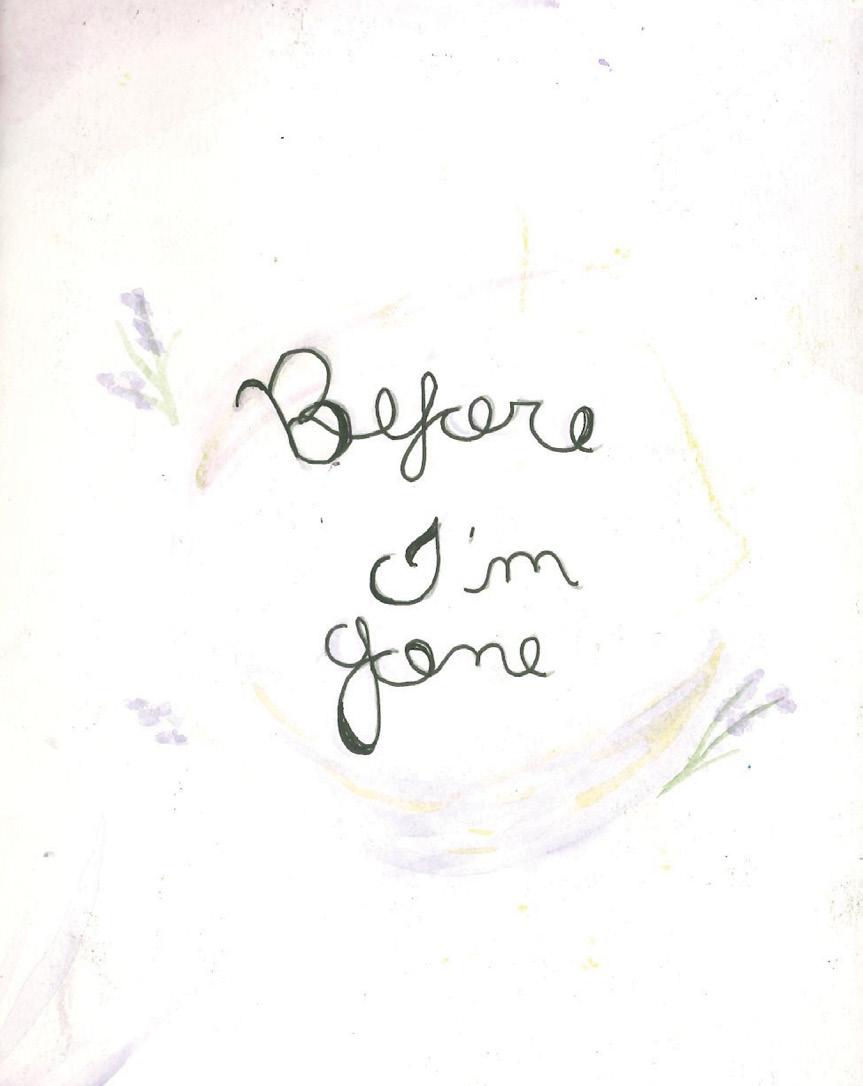
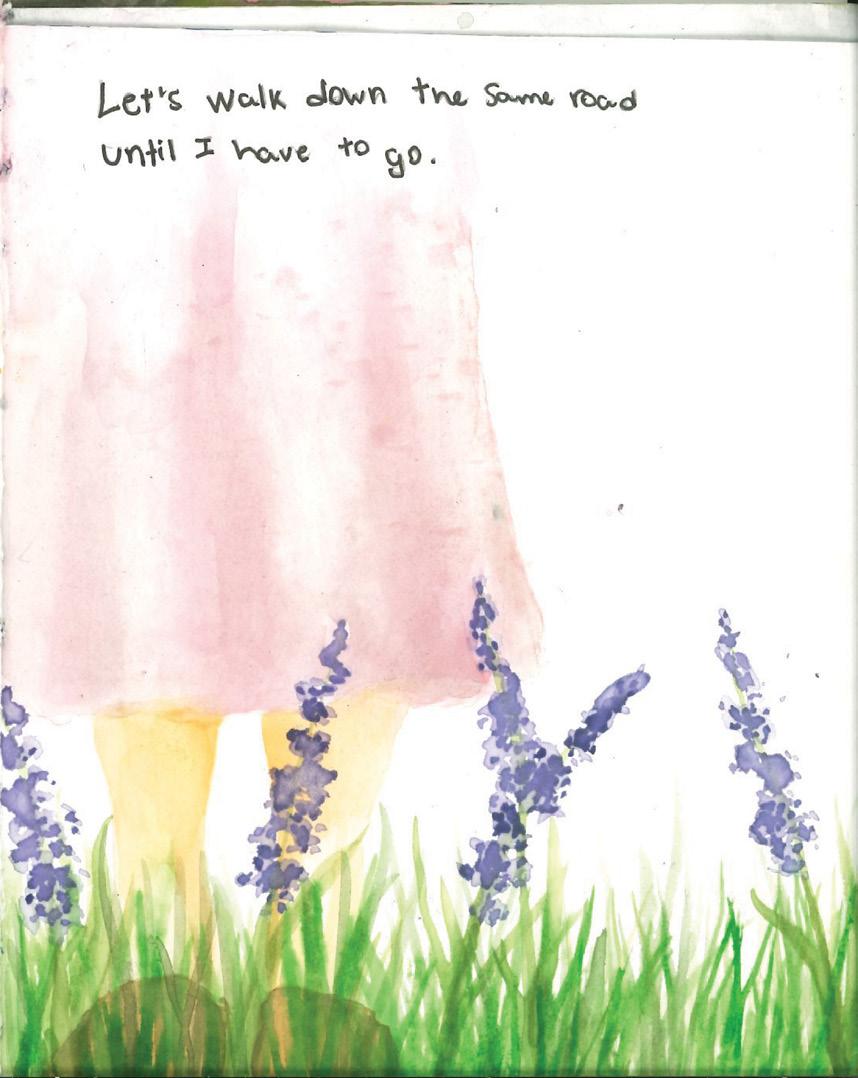
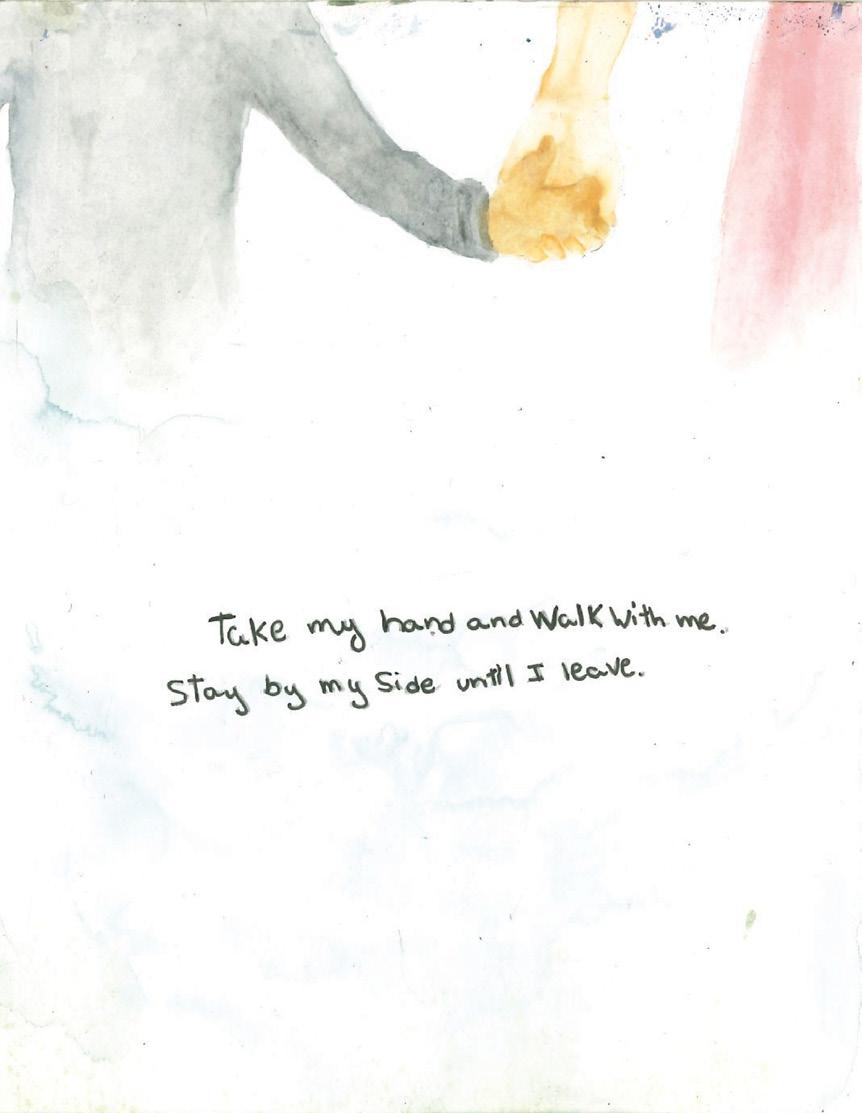
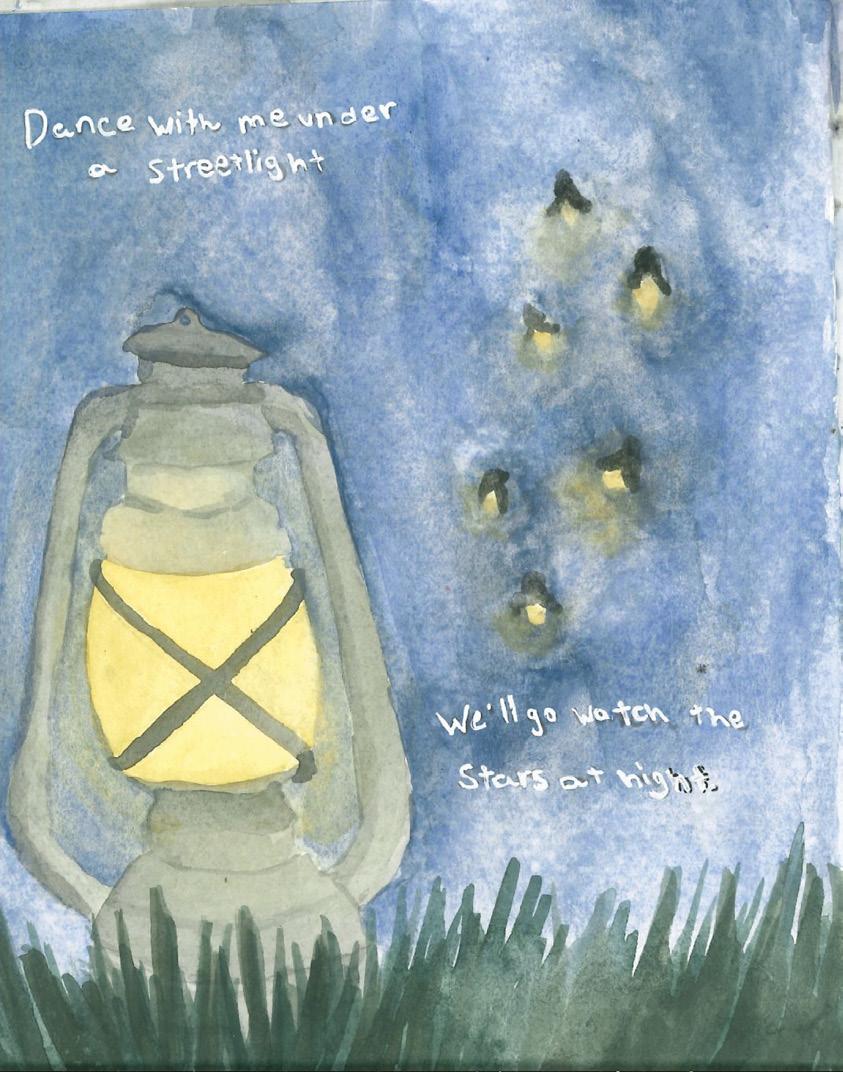
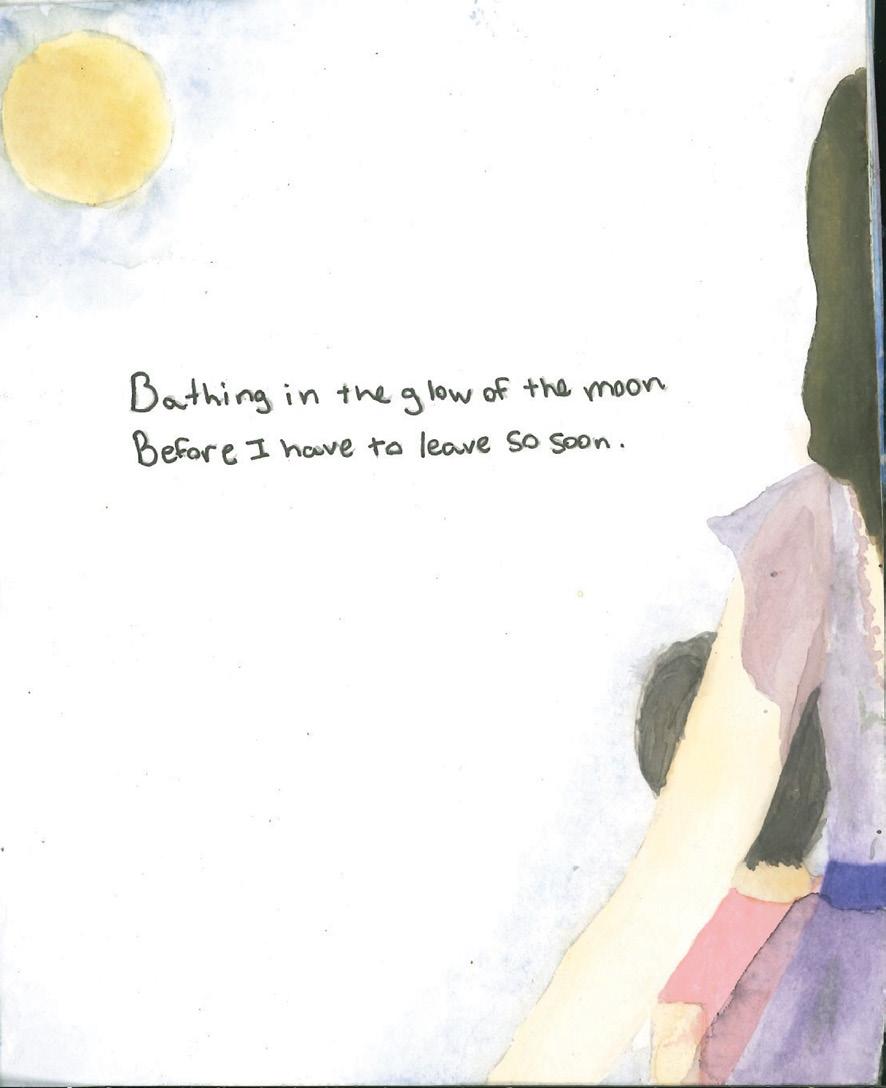
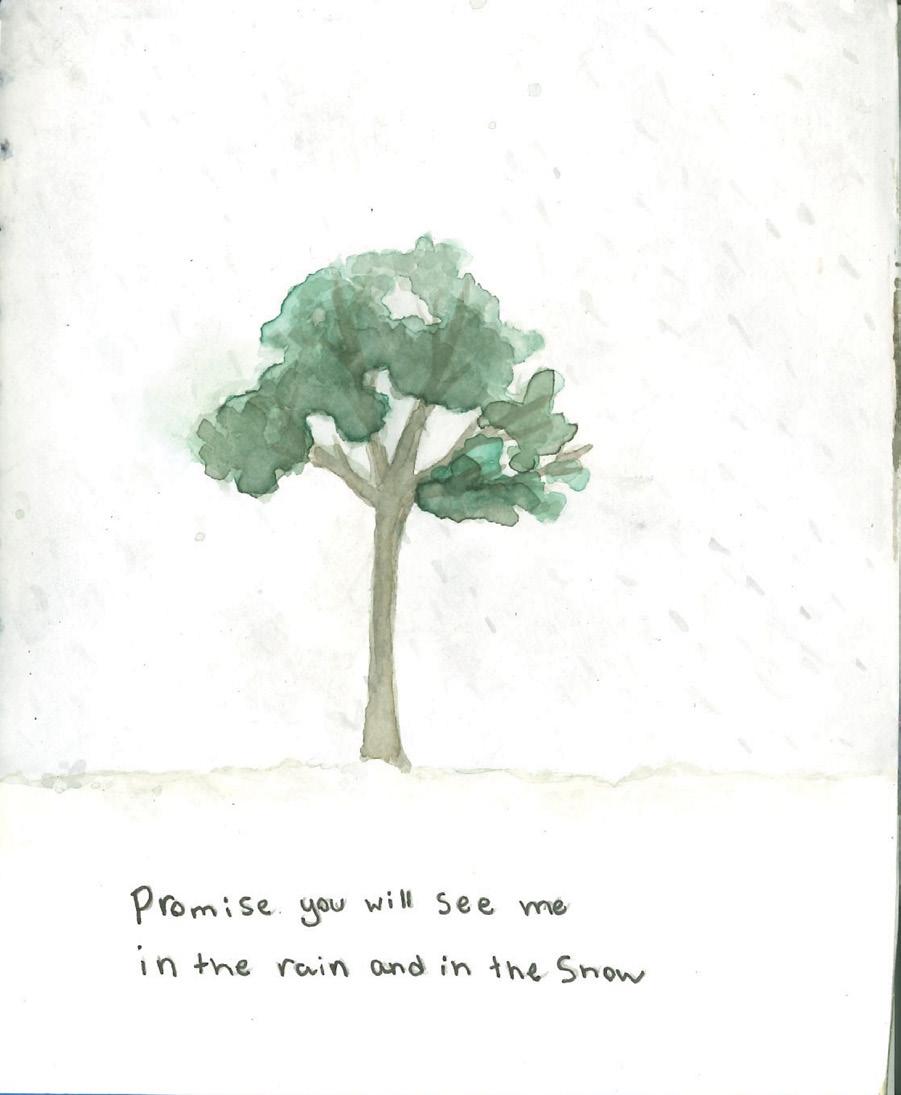
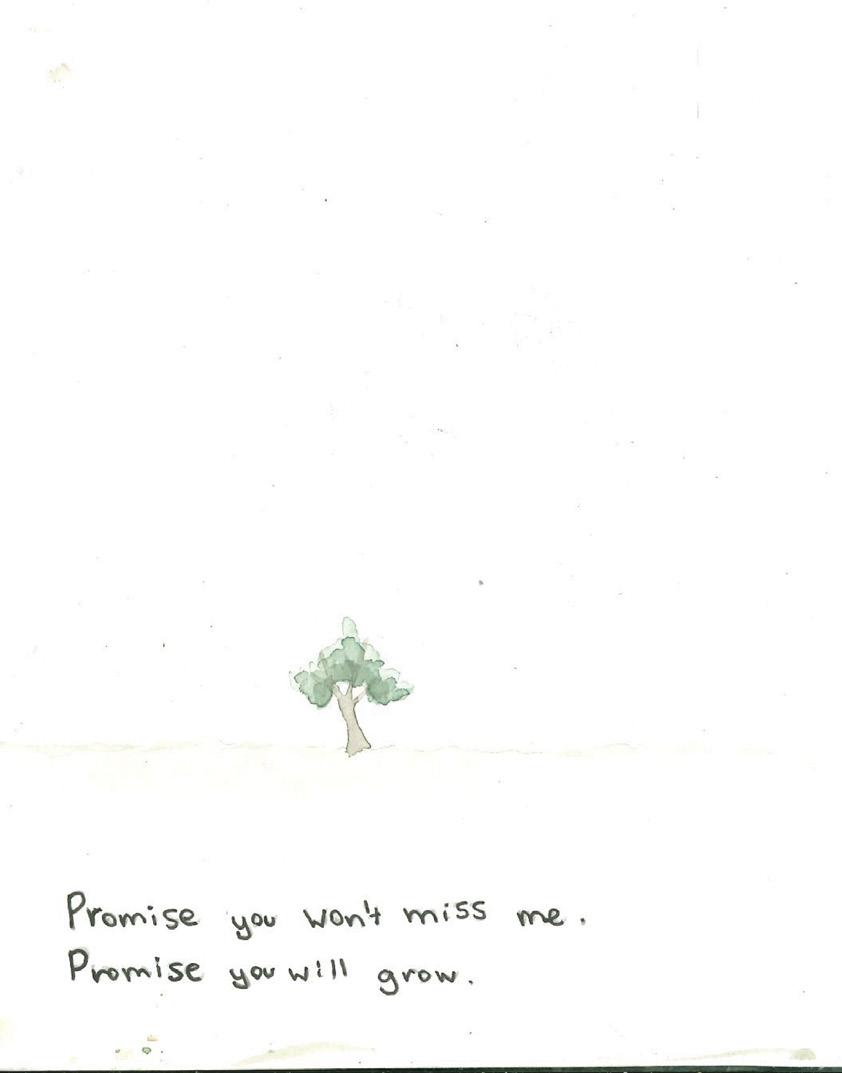
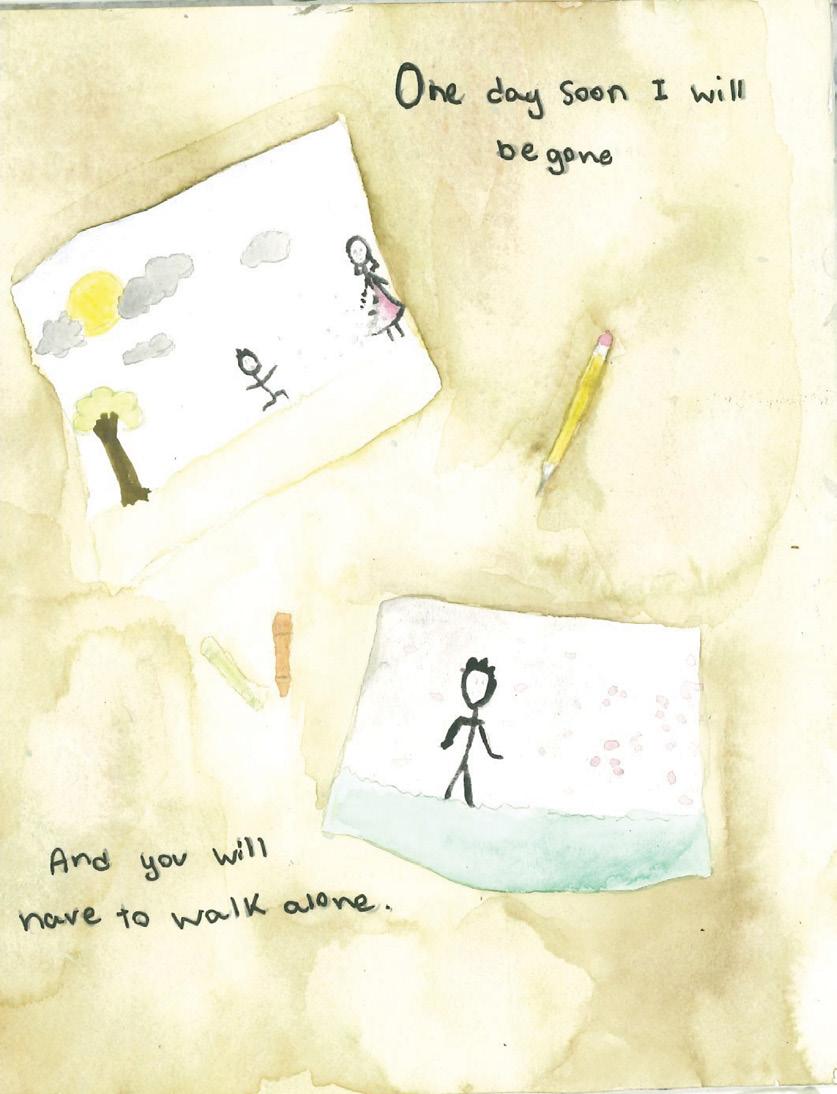
Before I’m gone by Gabby Dos Santos Gonzalez ’27
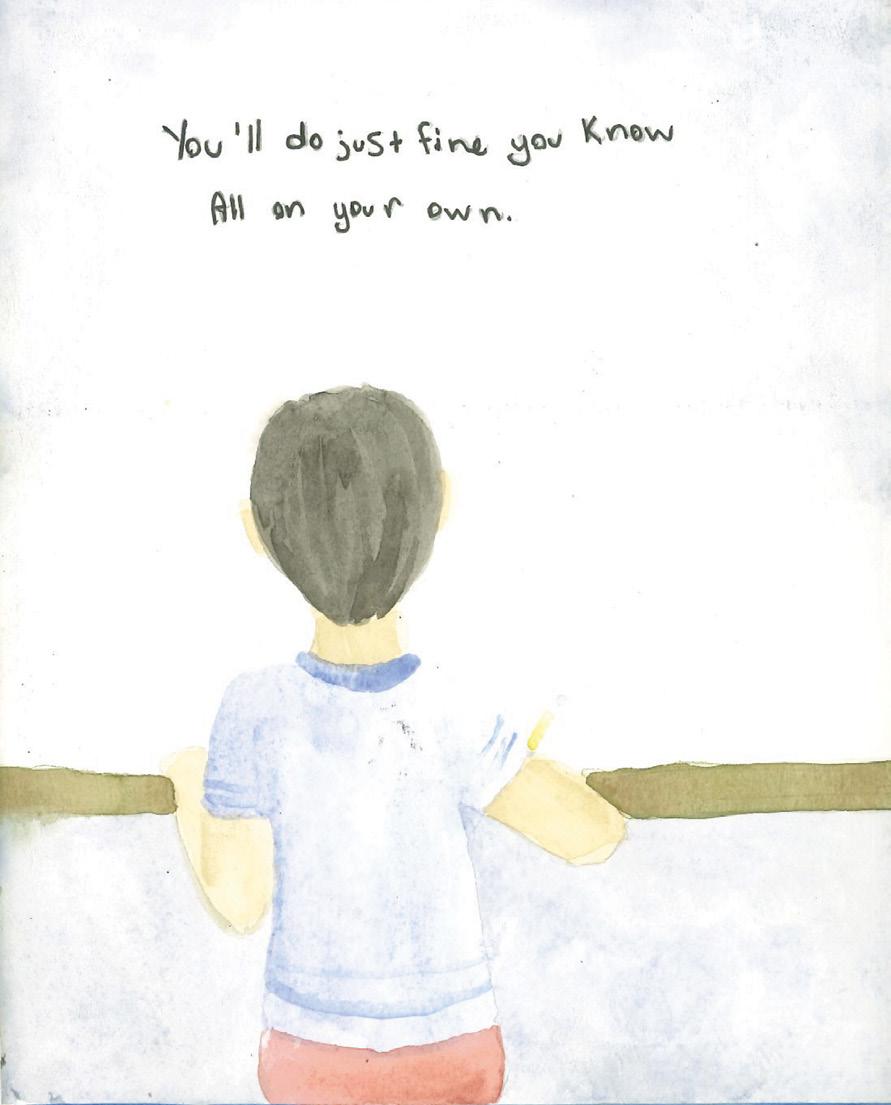
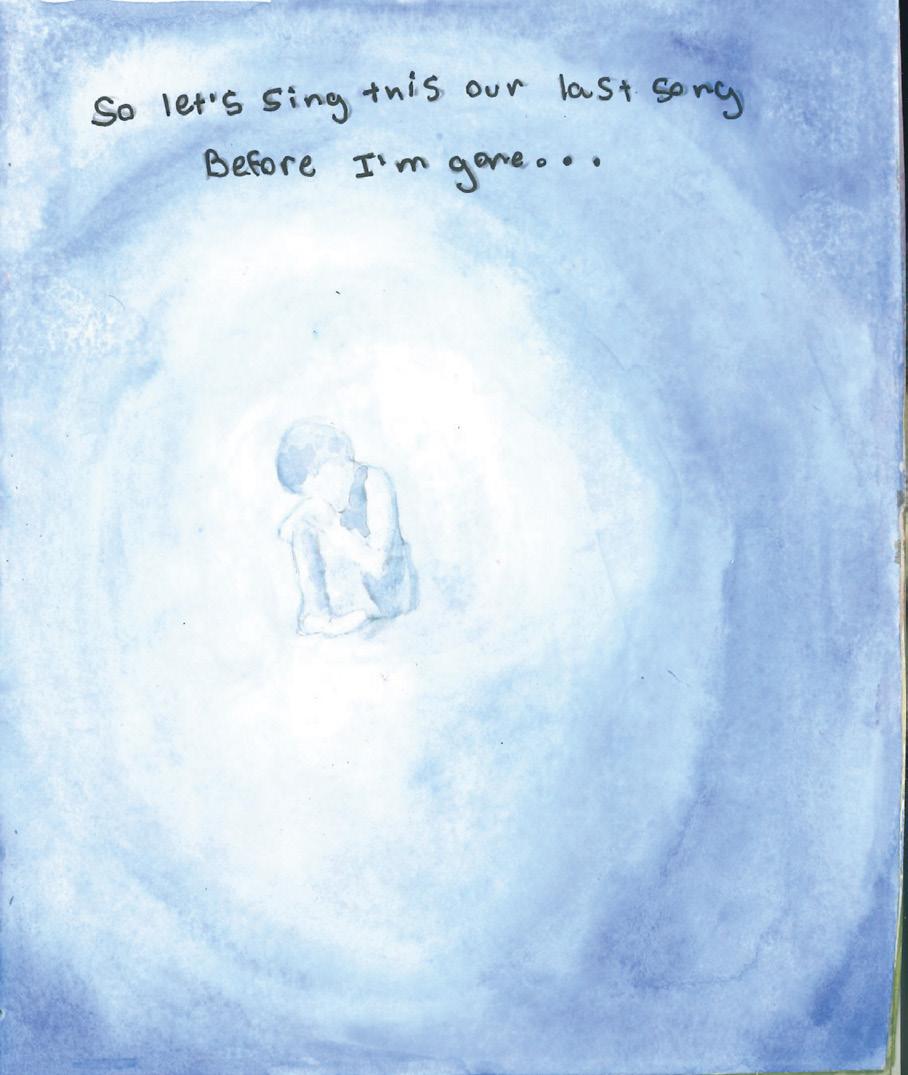
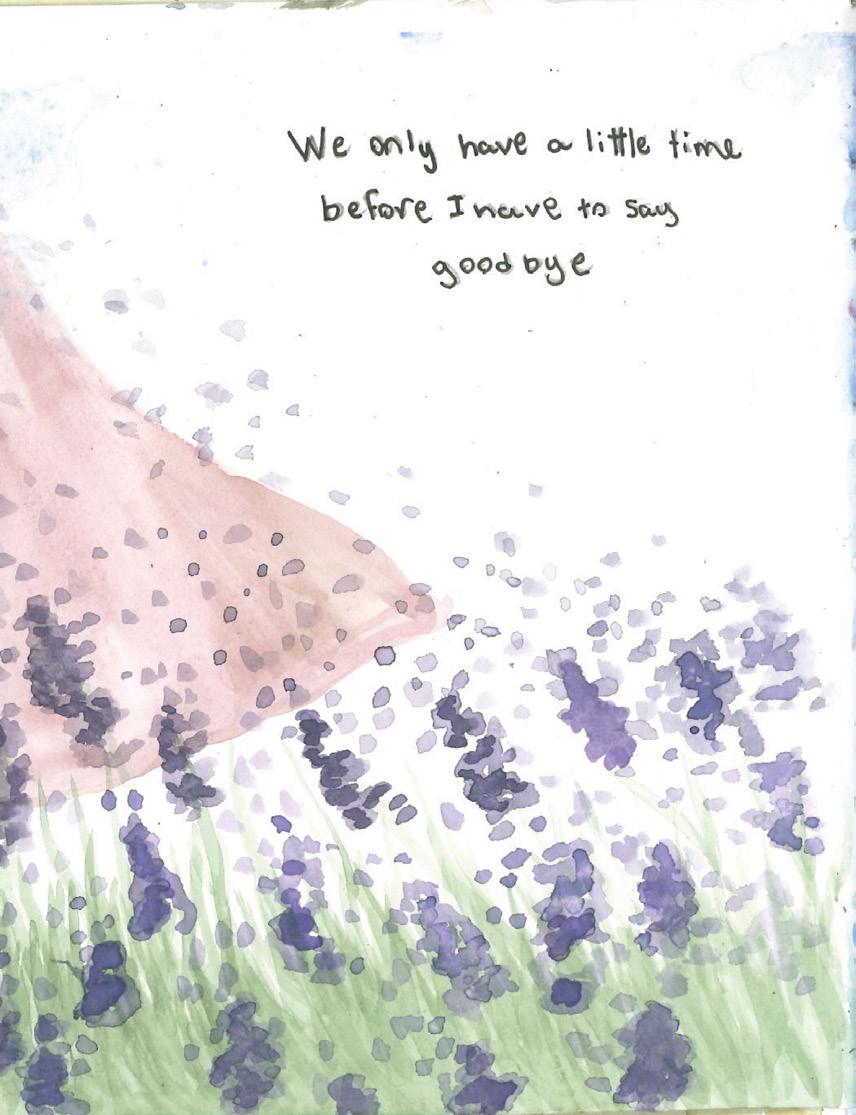
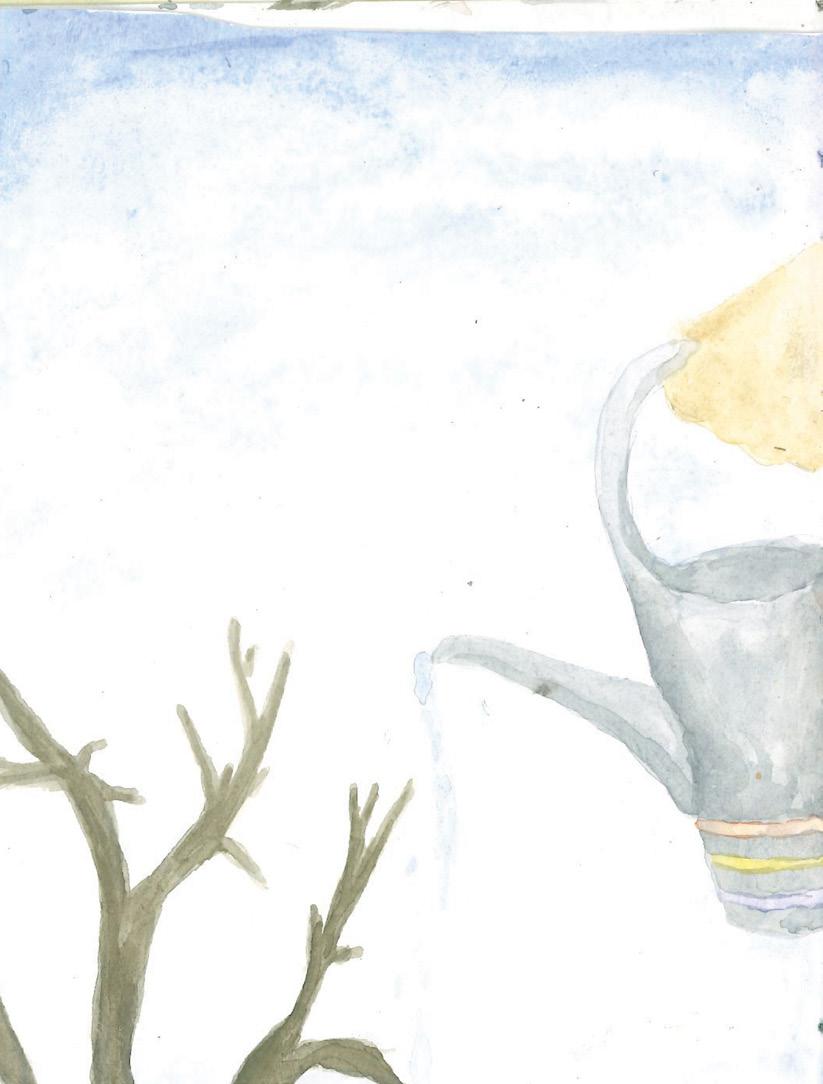
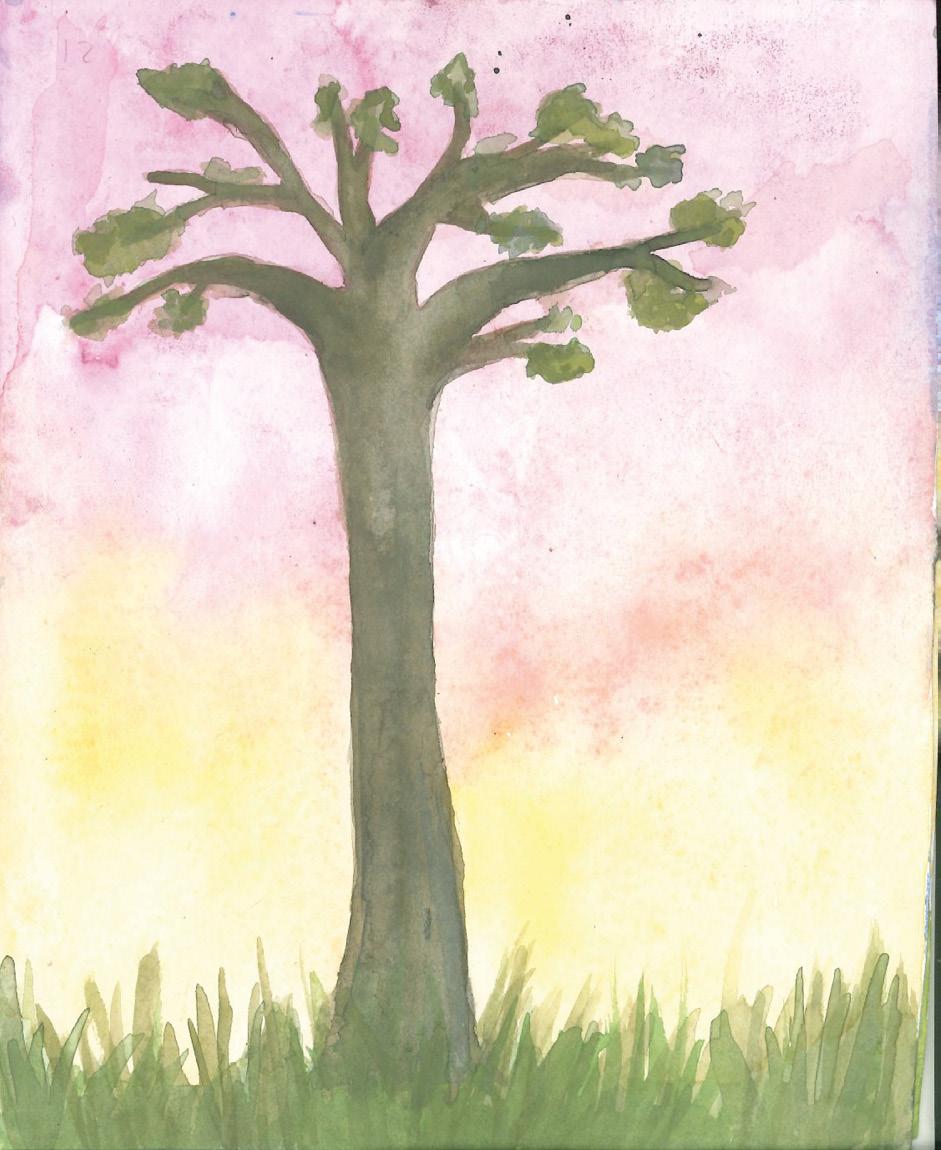
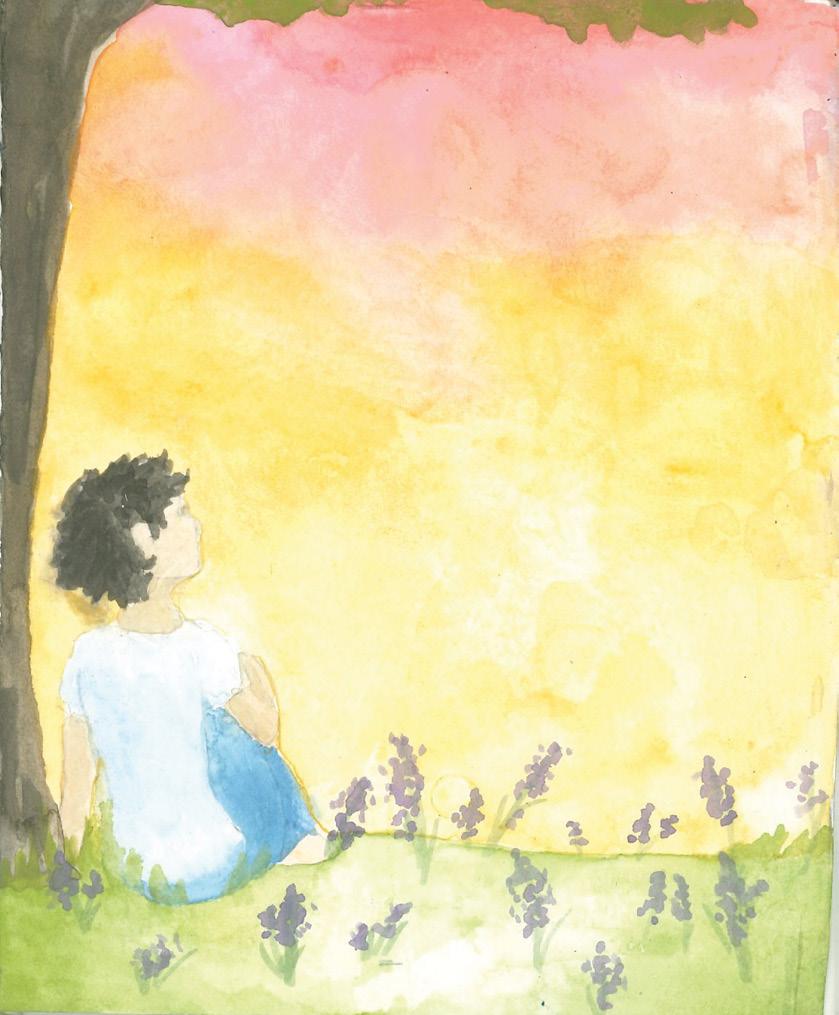
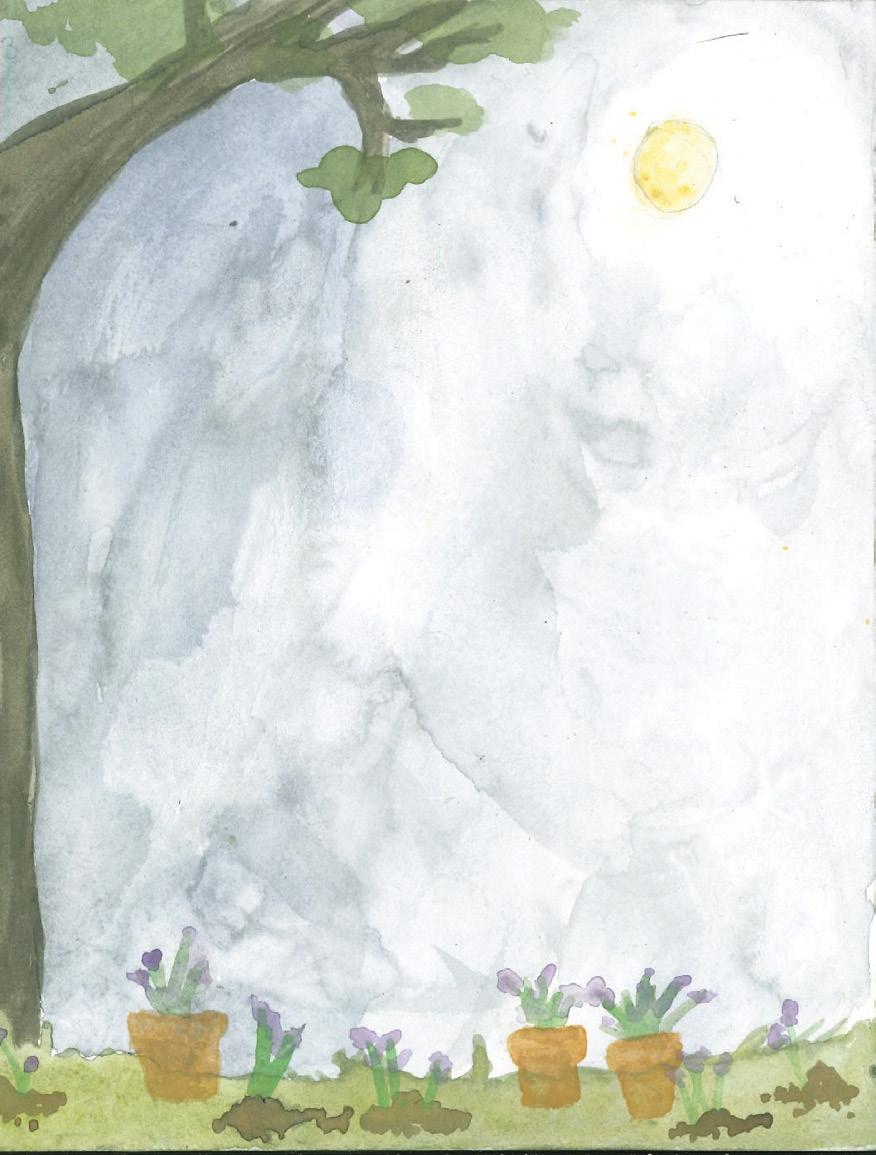
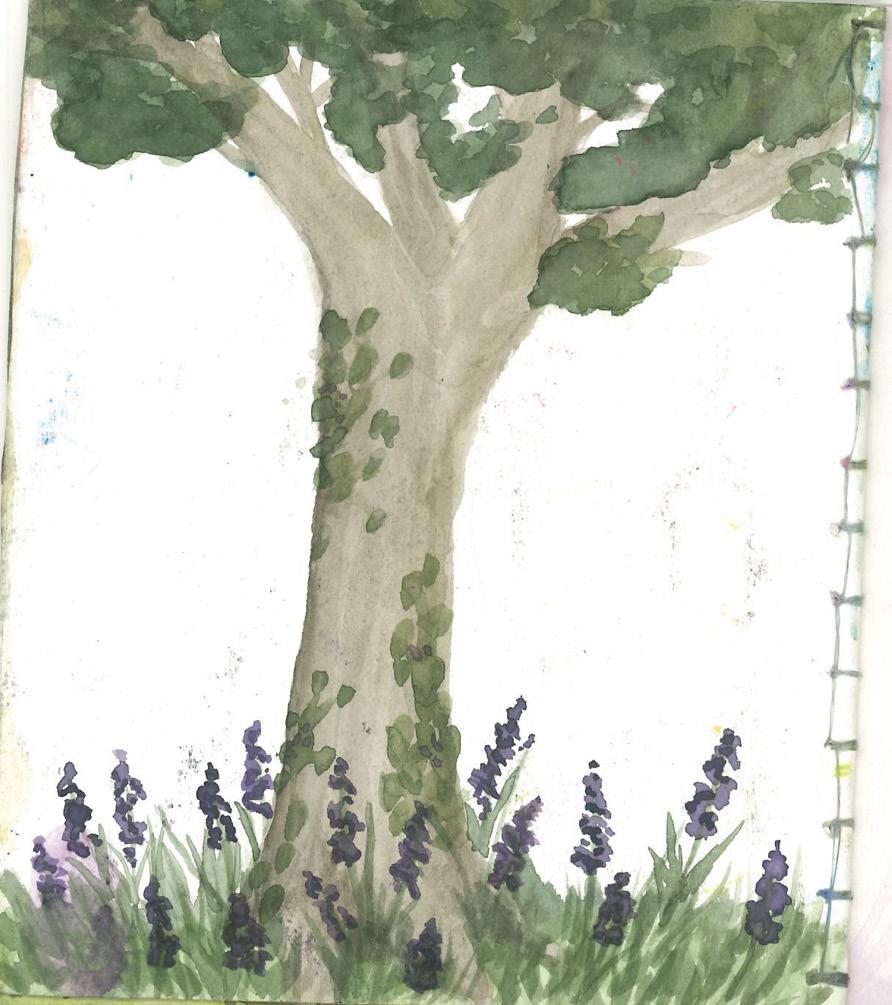
Childhood Home
by Ash LaPlaca ’25
No one could say our home was ever quiet. There were six kids and 2 adults living in the decently small home. I’d be lying if I said I didn’t have a lot of good moments and memories of my home.
But I’d also be lying if I said it was all a walk in the park. The home had a million things painted or pinned up on the walls inside, but the exterior would never suggest that such a messy family lived inside.
I don’t know how to describe my home without describing my family. I’d lived in that house since I was 3, and I got a new stepmom and 3 step siblings when I was 6. We all shared rooms with 1 or more other people, but that was okay, that’s how we were able to have long night talks under glow in the dark stars pinned on the ceiling, or through the top of the bunk bed above us.
There wasn’t a single room in the house that was orderly. It frustrated my stepmom everyday, but that’s just what you get with a big family.
Our house had a front door that made more noise than dropping and breaking glass plates. And there was a multitude of sports equipment in the backyard,
probably because only a sixth of the kids didn’t play at least 1 sport.
The house was falling apart more every year, but we loved it. When the house flooded the first time, we fixed it and kept living. When the roof and whole first section of the house flooded again, we used it as an opportunity to improve on this place we loved. By then though, the house wasn’t quite as filled with love anymore.
Siblings had moved out, parents were divorcing again, and everyone still left were now teenagers who couldn’t go 5 minutes without fighting. A home that had once held more than its fair share of love and care and people was now a lonely and toxic environment.
Towards the middle of sophomore year, I was moved from there without knowing it at first. After being away for just a month, my house, the only place I’d ever called home, felt like a ghost town.
My room was now too dark and claustrophobic, the art on the walls everywhere no longer holding their magic, the mess in the house now suffocating rather than just a little mess.
You never realize what makes something a home until it’s too late. That something is family.
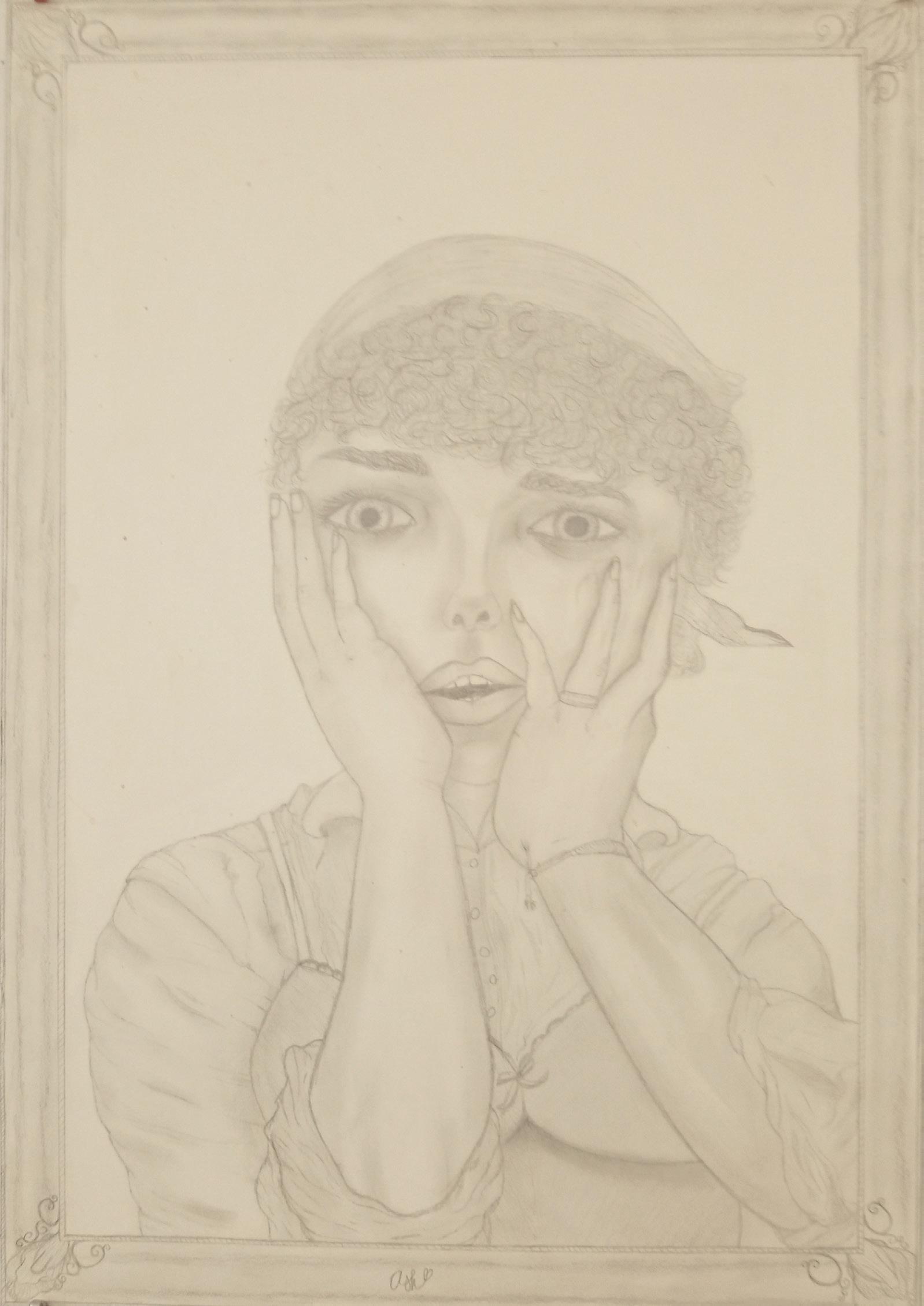
Don’t Look Up
by Kate Barnes ’27
Dinner time had come and gone, the sun had set completely. The stars were out, and I was still sitting in my desk chair, staring at the ceiling.
Granma was gone. That one thought played over and over in my head until I was almost numb to it. Almost. Rubbing my face, I leaned my forehead against the wood of my desk, but it didn’t stop the memories.
She sat upright, and her eyes were wide and staring. There was something about them that seemed off, something about them that made me think that I no longer knew this woman. “Granma?” I asked. She met my gaze for the first time. Her eyes were dark, so dark.
And after that, when we visited her for the last time.
She lay in the hospital bed, and the fluorescent lights made it seem like she was small, which couldn’t be right. The doctors were telling us that she was almost gone, and I wanted to correct them. She already was.
I opened my eyes, weeping freely. My room looked the same, which was impossible. Everything was different. And
yet, there was my bed with blue sheets, my bookshelf, my lamp with hearts on it, all of it just as I left it.
I dropped my gaze to my desk and started absently tracing constellations between the tears that had fallen on its black surface. Constellations…
“Look up.”
I did, craning my head to look at the night sky. The Milky Way arched over us, impossibly vast, impossibly close. The stars were fragments of shattered glass spilled across the sky, sharp and cold. I shivered as white light smothered us like invisible snow. We sat in silence for a while, looking out at the rest of the universe. It was like peering through the window of a house you had lived inside your whole life.
As you stared, you could feel your perception of space shifting, expanding. Suddenly, what you thought was everything was only a drop in the ocean.
I realized at that moment that everything I thought was big was terrifyingly small. Everything was different. I was nothing, I was slipping, falling upward off the earth. If the stars swallowed me up, nobody would notice. A drop in the ocean.
I tore my eyes away and looked back at Granma. I needed something from her, reassurance maybe. I looked at her, and the
stars were reflected in her dark eyes, as if some part of her had already fallen.
I got up and looked out my window. The stars blinked back at me, exactly as they had done on that night so long ago.
A strange anger grew inside me. How could they be the same after she’s gone? How could they take her and leave behind nothing? My Granma wasn’t just a drop in the ocean, she was everything. Granma, in that hospital bed, looking so small.
Tears spilled down my cheeks. And then another memory floated into my mind. I remembered sitting in her lap, listening to her describe a world I would never see. I remember how her words wove colorful tapestries, how they wrapped around me like blankets and made me feel warm all the way through.
“What happens next, Granma?”
“You decide,” she said. “That’s the great thing about making stories. Your words can be anything you want them to be.”
Slowly, my anger drained away, leaving behind only determination. I walked back to my desk and opened my laptop. I started typing, and the words came easily, almost as easily as the tears I had cried. The words became sentences. The sentences became paragraphs.
They spread across the blank pages like vast galaxies, like swirling nebulas.
A universe of memory, of warmth and love. Our cold stars may stretch out endlessly, randomly. Meaninglessly.
But with every story she told, Granma taught me that there is a flame inside each of us bright enough to bring warmth and light to all that emptiness, no matter how small.
She taught me how to make art, how to remember, and I would. Despite the coldness of her last days, I would remember her warmth. Despite the stars outside our window, I would show everybody that my Granma’s life was not small.
I sat at my desk, my face illuminated by the light from my computer screen. The night was still and dark, until it wasn’t.
In the house next door, a light came on. A mother soothed a crying baby with a bottle. A group of people walked along lit streets, talking and laughing. A man read to his children from a battered book. An elderly couple sat on their porch, waiting up for their daughter.
The universe, as vast as it was, spiraled above them all, but not one looked up. There was no need to.
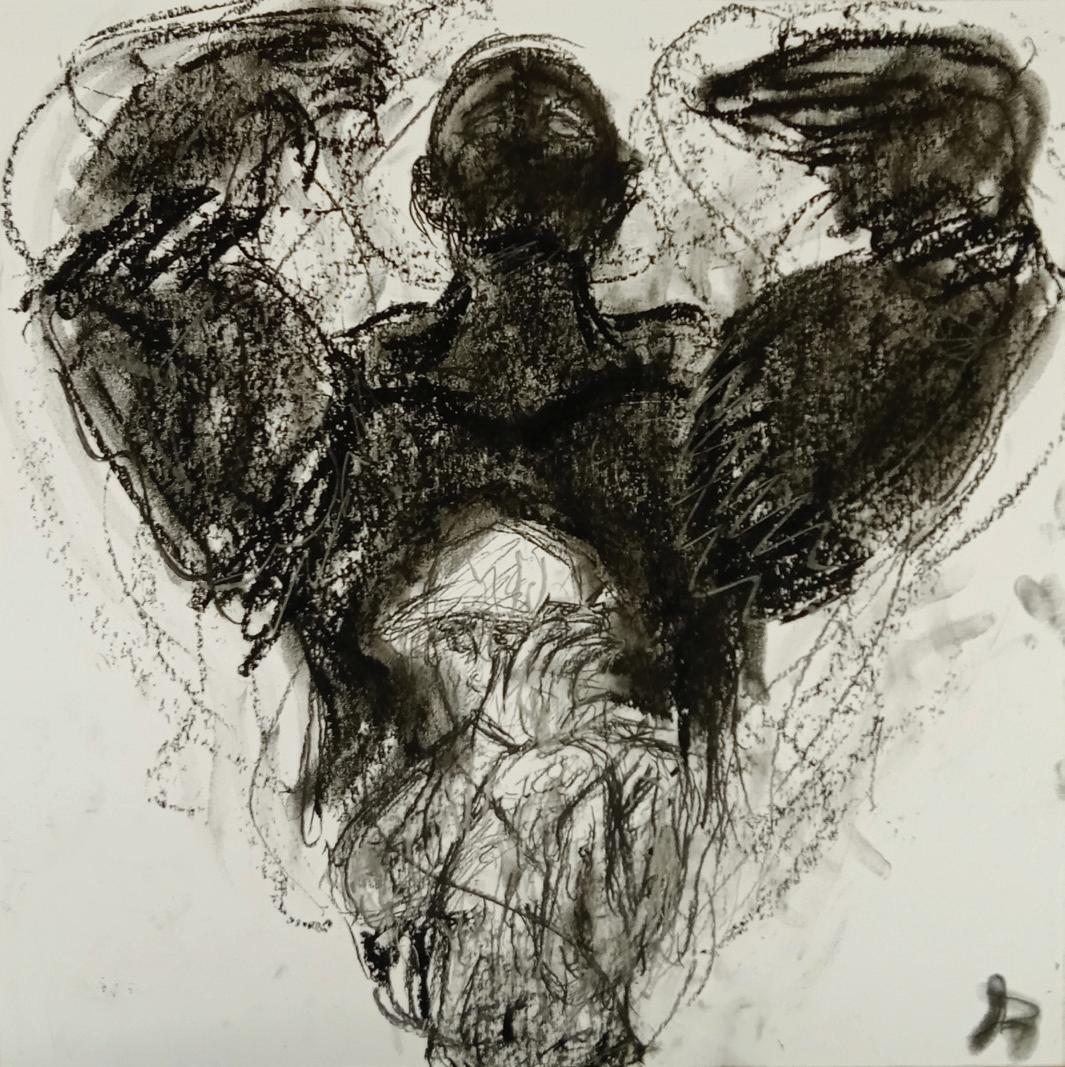
It’s over.
by Aaryan Gandhi ’25
It’s over. Papers scattered across my bedroom floor. Nights studying blurred into the morning. Brewing a coffee every couple of hours started to become a routine.
Amidst all the stress and anxiety, nothing felt more relieving than life after final exams. Better yet, what about life after exams in high school? Or life after exams in college? Then, it’s finally over.
My weary, miserable, irrational thoughts at 3 a.m. before my exam led me to the endless conundrum that is
the sameness of life. In my imagined, peachy vision of the distant future, will I truly feel free? Is it ever over?
However, at that moment before my finals, it was undeniably over. While trying to remember the complicated laws of thermodynamics, my mind kept drifting away, thinking about drawing Lewis structures for basic molecules in sophomore year.
Leaving the exam hall, I re-asked myself the same question I had the night before the exam.
The answer? Life is one and done. Why set a future time to enjoy life in the sacrifice of missing the present?
Out in Texas by Nolan Wilson ’27
At night
Out in Texas
it’s a desolate and lonely place
Everything enveloped in darkness
That is, except your face
Look around and all you see
Is figures in the night
Shadows and ghouls
Dance about Prance, if you like
But if one looks to the sky
And chooses to lend their gaze
The stars will take you on a journey
Spark a candle alight
Your eyes will traverse for miles and miles
A ceiling of exquisite mosaic tiles
Up there too is the moon of course
Chandelier of the night
Bright and coarse
Sounds of the darkness
The hum and the buzz
Melts into the ethereal fuzz Lights. Colors. Sounds. Noises
Mimicking a chorus of voices
Crescendo booms with a loud blast
The end of the show
Oh, at last Blink once Blink twice
The sun staring down, bright and nice
“I must get going, and get some ice.”
“Oh man, oh man, where even am I?”

Red Benz by Simon Lindenau ’25 Nikon z6 with Sigma
Artist Sp otlight
“Nostalgia, memory, and glorification of the past are some things I express in my pieces.”
Sylvia Valverde has been fixated on the past.
As a high school senior soon to cross the boundary between childhood and adulthood, Valverde expresses longing for bygone, simpler times through her art. Her recent works focus on themes of “nostalgia, memory, and glorification of the past.”
While painting The Future’s Undertow (p. 33), Valverde reflected on the sense of being caught between the past and the future. According to her, the soft shapes and primary colors in the painting’s background represent nostalgia, while the black wave at the center of the work is the future holding her back from the past that she longs for.
Valverde typically works with acrylic, watercolor, and colored pencils, as can be seen in The Future’s Undertow, but has also recently begun experimenting with magazine clippings, as can be seen in rusted memory (p. 13), another piece exploring nostalgia through the depiction of a childhood bedroom.
In The Future’s Undertow, look for: The intentional placement of color throughout the piece. According to Valverde, “Each bubble, and each hint of blue, red, yellow, etc., was specifically placed in order to create a cohesive scene.”
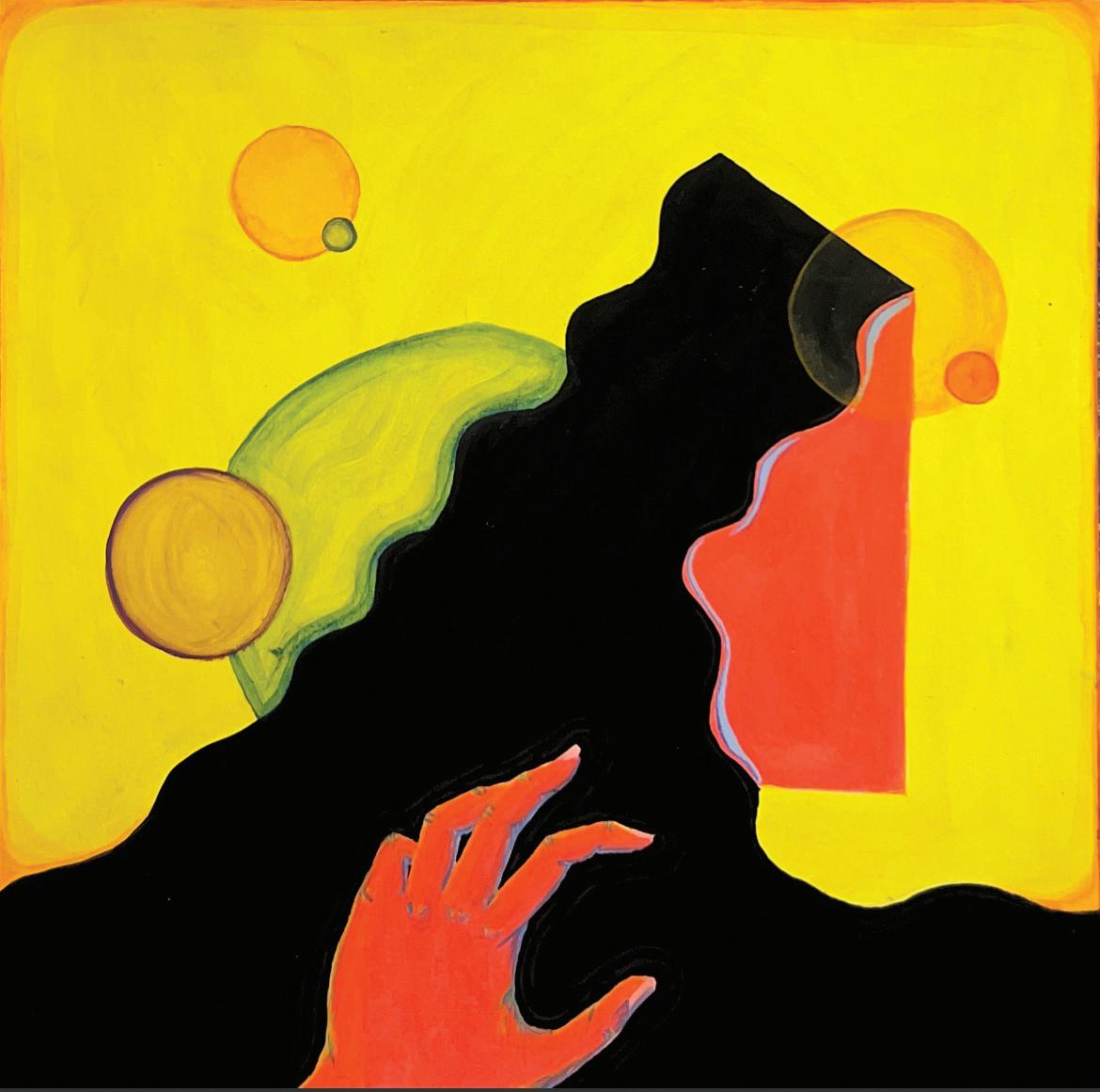
The Future’s Undertow by Sylvia Valverde ’24
Acrylic, watercolor, pastels, and colored pencils
Last Repast by
Annabelle Do ’26
As I parked my car into the garage, I thought of what I had to do before my husband came home. I went through my mental checklist, consisting of folding our laundry (which was checked off), cooking dinner, and cleaning the kitchen. I peered into the fridge and saw what I had to work with: meat chops, potatoes, and green beans. It was about 8 PM, and James would be home in about two hours.
Cooking dinner was pretty simple today. I boiled the potatoes, mashed them, and mixed them with the butter. I sauteed the green beans, then cooked the meat chops on the skillet with butter and made the special glaze that I knew that James would like after a long day of work. He always said that I made the pork chops better than anyone that he knew.
“Hi Amelie!” he said as his footsteps tapped along the tiled floor. I greeted him back as I put the beans, potatoes, and meat onto the blue ceramic plates and set them on the table.
I saw James cut open the meat chop. It was perfectly cooked, not too dry, and the red glaze coated the piece of meat perfectly.
I knew that the moment he took a bite of the meat, he would love it immediately, as he always did.
After we took the first few bites of our dinner, we exchanged what happened today at our work. We exchanged gossip from our different departments at work and other news that we had heard about.
I was reluctant to share my bit of news as I wasn’t sure as to how James would react, but I figured that he should know about this bit of news as I found it too important to hide from him.
“The current head of my department moved out of town and left work without handing in his two-week notice or giving a reason why he was leaving,” I started off. “He just disappeared out of the blue, and nobody is able to reach him at all. As of right now, they’re looking for someone to take the position.”
He nodded, motioning me to continue. “I was thinking that I could take up the position,” I finally told him. James set down his fork and knife.
“I still have to go through the interview process, of course,” I continued. “But think about it—I could get a 10% raise and whoever gets the promotion gets to start as soon as this coming
Monday. You know how much I’ve always wanted this position—”
“You know that’s a no, right?” he countered. “What would everyone think?” Every time a similar opportunity came up, he always showed some sign of disapproval.
But still I persisted and continued speaking. “I just think that it’s a great opportunity, that’s all. We’d be able to afford the new car that we were looking at, and we could probably go on more vacations as well.”
“How many more hours would you have to work, two hours? Or three?”
“Probably,” I responded. He didn’t reply; he only stabbed at his green beans and his mashed potatoes listlessly with his fork. It was 11 PM. I was tired, and he was tired. Neither of us really wanted to get into a screaming match so late at night. So with resignation, I added on, “Well, I’ll give it some thought. I might not take it anyways.”
He nodded his head, but after a few more pokes at his leftovers, he left the table to get ready for bed. He finished the pork chops that he adored, but the majority of the mashed potatoes and the green beans were still remaining after he left the table.
In the end, I finished my portion of
dinner and cleaned up our plates and the rest of the kitchen.
***
I was making my usual tea, chamomile with honey, to help calm myself enough to sleep well that night. I was still replaying the near-argument that happened earlier. Should I try to apply for the position, or should I not? I couldn’t understand why James was so against me being interviewed for the position, or why I didn’t fight with him for the approval.
Why did I need his approval to get a promotion for my job? It was mutually beneficial.
“Amelie?” he called out as he walked into the kitchen. “Are you going to bed soon?”
“Yeah, I am.” I paused. “I’m still thinking about dinner. I’m going to do the interview tomorrow and I’ll get the promotion.”
I could still remember hearing his anger boil as he shouted, “This isn’t right. Everything is working great the way it is, and now you’re messing it all up with you coming home later! Nothing is going to get done around the house.”
“Well, maybe pick up some respon-
sibilities, for once!” I counteracted. “Nothing is going to stand in the way of me and my promotion.”
In the corner of my eye, I saw the glint of one of the kitchen knives on the counter, and I knew. If he couldn’t live with me pursuing greater opportunities, then maybe he shouldn’t be alive at all. So I picked up the sharpened knife and walked up to him.
“And I’m sorry, but you’re blocking the way,” I said as I plunged the knife into his chest. “Excuse me.”
The expression of anger quickly morphed into shock as he processed the pain and what he saw. Blood spurted out from his chest, dark red and sticky. I twisted the knife around for good measure, then took the knife out.
James fell to the floor, covering the fresh wound and trying to stop the bleeding to no avail. The blood gushed out even faster, quickly pooling around his body.
“Any last words?” I asked.
His only response was some choking and gurgling, followed by a long, pregnant pause. I looked over and smirked as the body grew colder.
I unlocked the garage door and stepped into the house. Even though it was a late night for me and I got much less sleep than usual, I still impressed my interviewer and was informed a few minutes ago that I had gotten the promotion that would be set in place in a few days.
I looked into the fridge and took out what I would use to make dinner: red bell peppers, juicy tomatoes, fresh meat, and ingredients for the glaze.
Dinner was simpler to make tonight as I only had to make dinner for one. I roasted the peppers in the oven with some spices and garlic. I grilled the chops on the skillet with butter and rosemary, and combined other ingredients until the blood-red glaze thickened into the right consistency.
I plated out the tomatoes, peppers, and meat and admired it with satisfaction. I set out some flowers in a vase and put on the fanciest dress I own.
I picked up the fork and knife, ready to dig in, but I realized there was no reason to keep my hands clean if they were already dirty. So I picked up the meat by the bone and took a bite, and the meat tasted fresh.
Pork chops have never tasted so good.
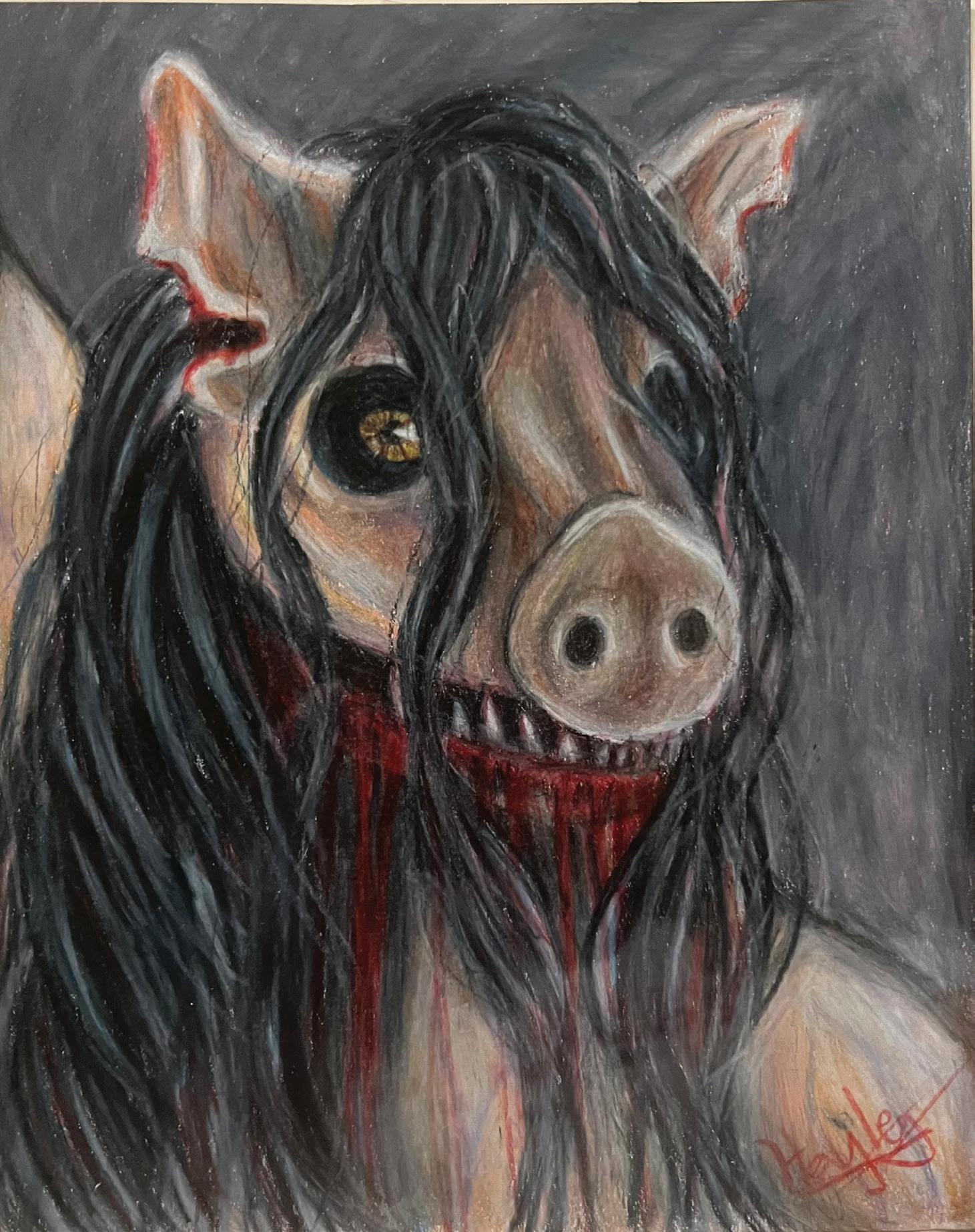
Erlik Khan by Hayley Clark ’27 Colored pencils
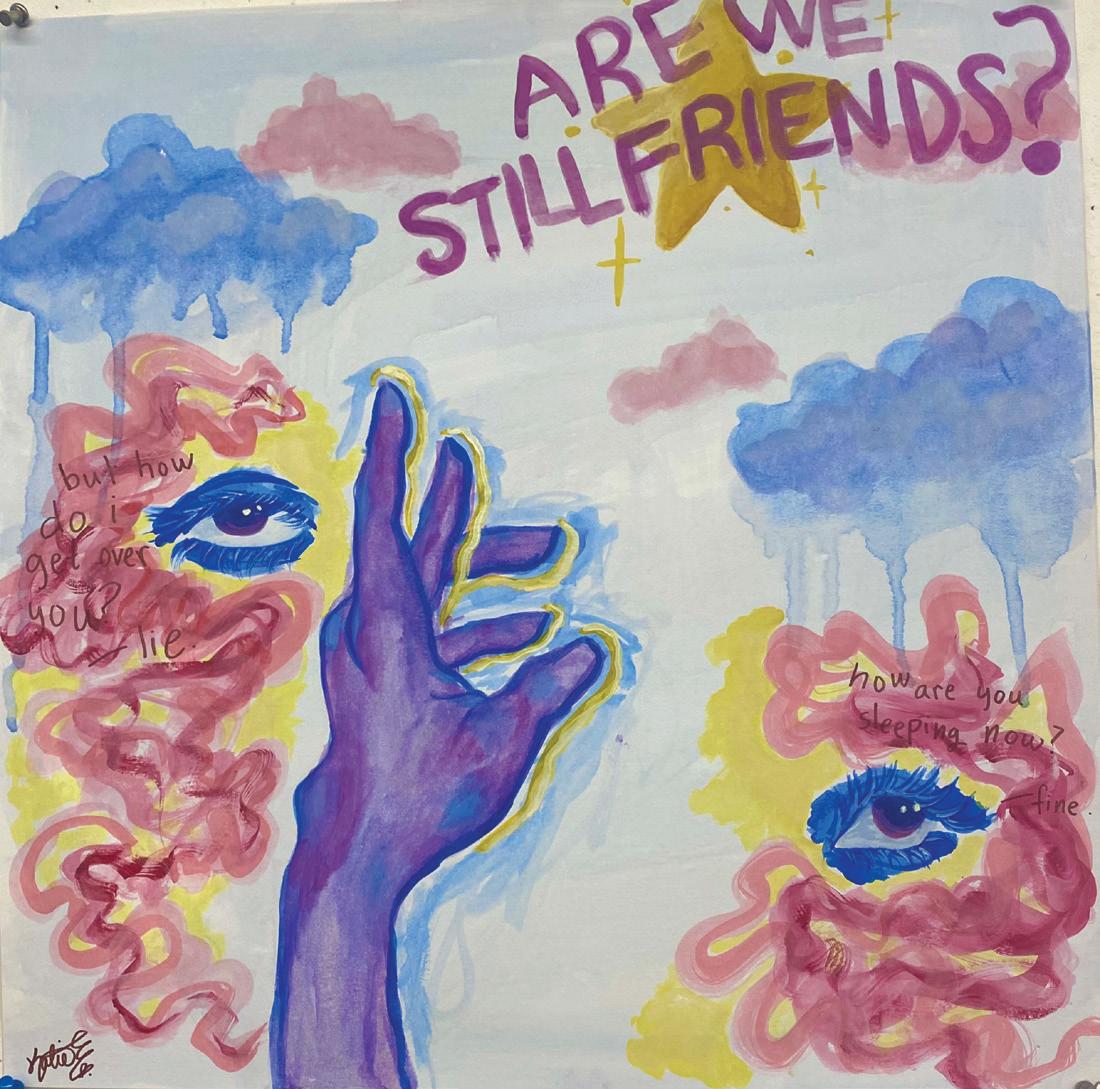
are we still friends? by Katie
Espinoza ’24
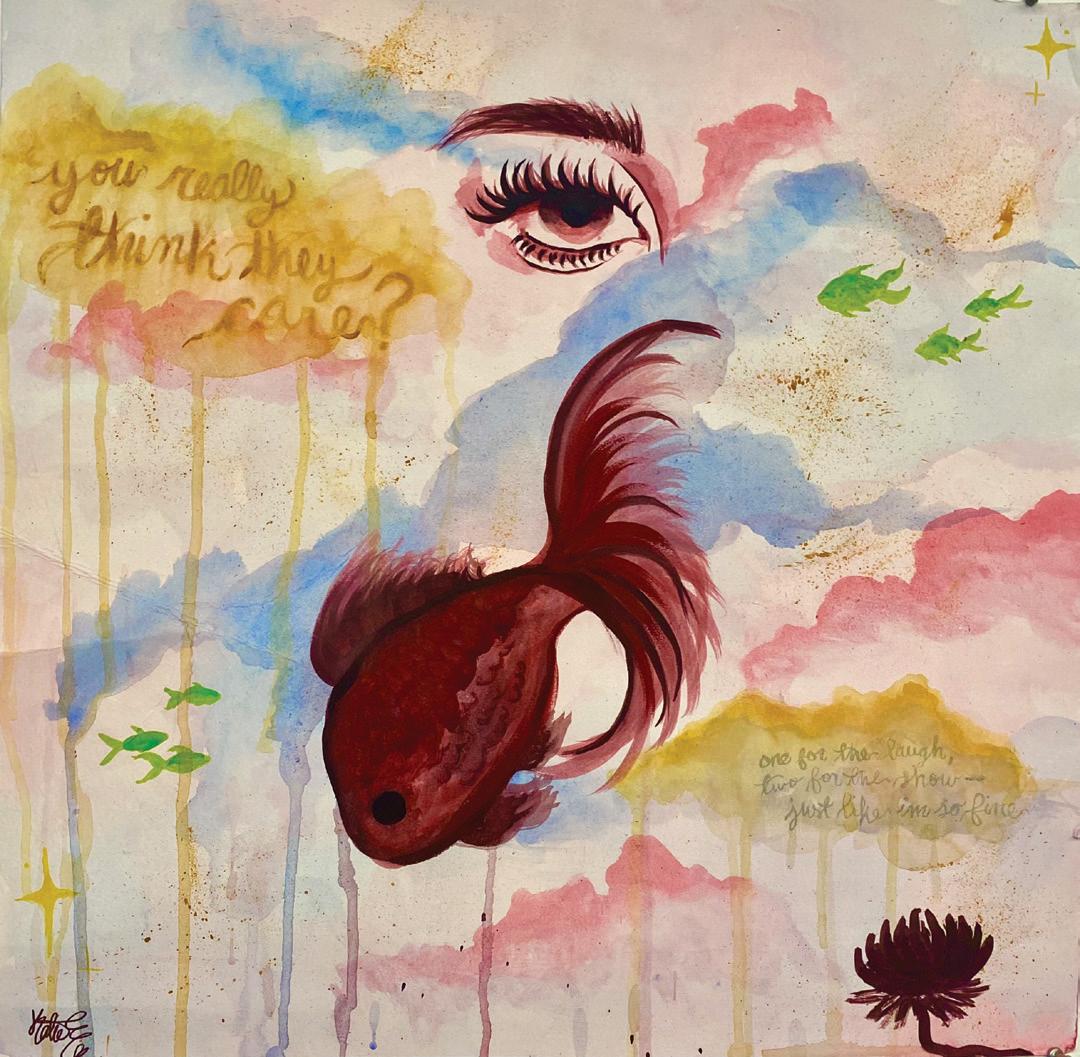
Abused as a young girl, my voice was stript
I express myself through a produced script
The verses I write tell an untold story And broadcast my accomplishments in all their glory
My words cut deep, and I shine a guiding light
To teach the African community, it’s okay to not be white
The Jim Crow laws and racism flood the streets
It’s like a never-ending cycle it always repeats
My pen is my weapon — I am an activist, after all,
Especially after Malcolm X calls
I Know Why the Caged Bird Sings was my biggest hit
That’s because I am an award-winning poet I wrote that book when our country was at our lowest
And our people often went unnoticed With crowds of white people lynching and mobbing
It left our community crying and sobbing
But that didn’t stop my spirit and hope
Even when our country felt broke
I kept on writing pen to paper
I just hope our country gets safer
I hope we all can learn to love each other like a neighbor And give glory to our creator.
melting
by Katie Espinoza ’24
Maya Angelou by Priya Chand ’25
Artist Sp otlight
“If I had to pinpoint what inspired me to do spray paint though, it would be the uncontrolled, raw, and free nature of graffiti.”
Kevin Liu is inspired by the “uncontrolled, raw, and free nature of graffiti.”
As Liu explained, “the origins of modern-day graffiti stemmed from people voicing their views publicly,” giving others a window into their unique perspectives.
Accordingly, free (p. 41) began spontaneously; it was created to cover up a different piece called rigo, which Liu was dissatisfied with. Liu chose the piece’s title and subject after listening to the song “Good News” by Mac Miller, which was released posthumously after the artist’s overdose in 2018. Liu explains, “I thought of free because he’s now in a better place, free of his worries and sadness, eternally resting.”
Liu also draws inspiration from other street artists. Prior to painting free, he browsed an international graffiti gallery website called Art Crimes, where he came across many pieces with a sharp, dagger-like lettering style. This sparked his exploration with the edgier, jagged lettering we see in free, an evolution from the “bubble letters” he painted previously.
Although less intricately detailed than traditional forms of visual art such as brush painting or sculpture, graffiti requires its own level of precision and control. Liu says of the medium, “A big part of working with spray paint is learning how to control pressure and the amount of paint you use.” Nowadays, Liu sketches major projects on paper or digitally before beginning, helping him conserve costly spray paint resources.
What You Think
by
Mia Crowder ’24
No, I’m not Filipino
No, I’m really not
Yes, I am Black
You don’t believe me?
Have you seen my dad?
No, I won’t say the n-word for you
That doesn’t make me weak
How can I even claim it
If I’m never what you think?
In free, look for: The sense of sharpness and explosiveness resulting from the piece’s unique medium and style.
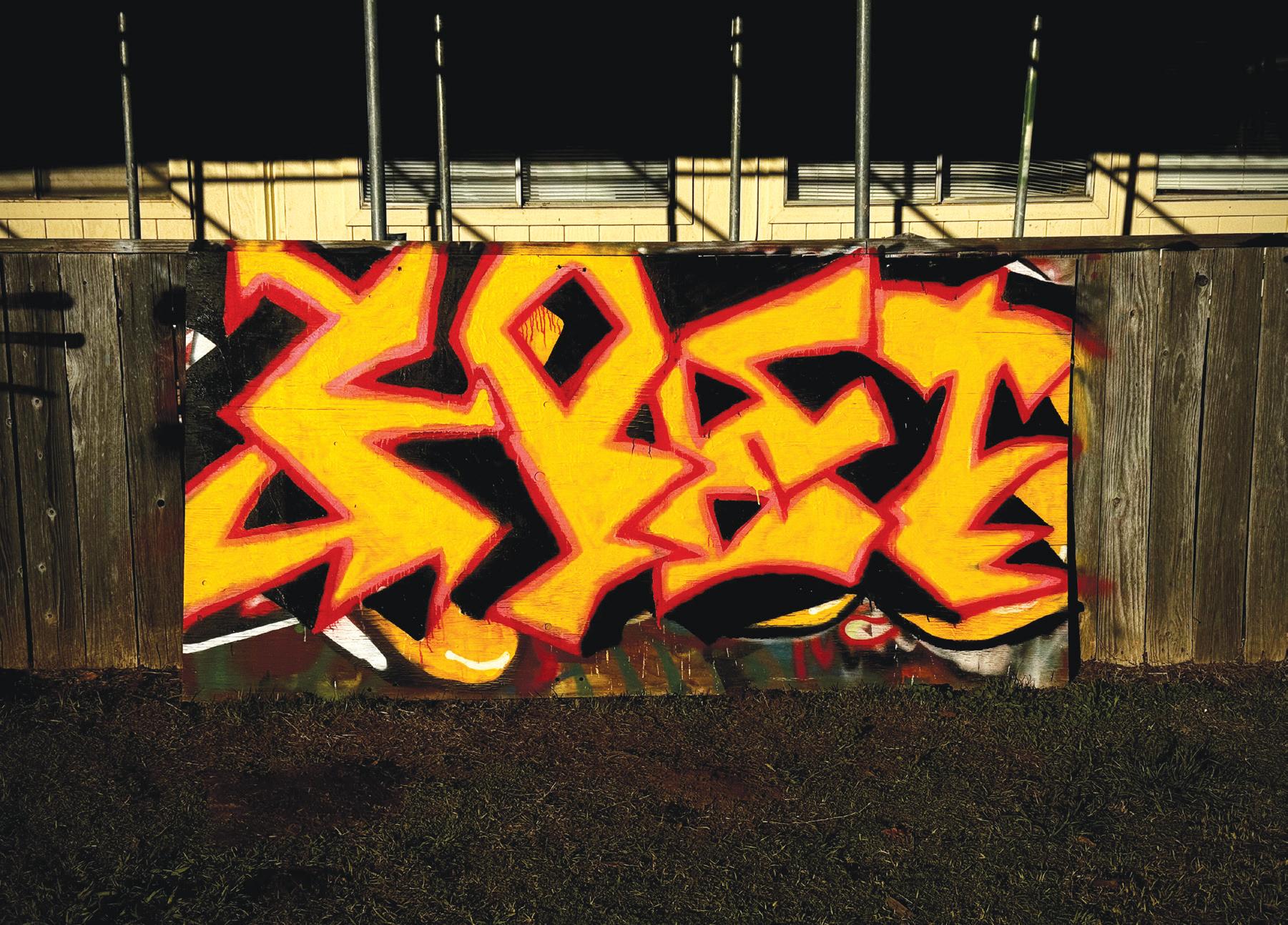
Editor’s Note: Due to the constantly evolving nature of Liu’s art, free was painted over shortly after its capture on photo.
free by Kevin Liu ’25
Spray paint on wood
Miscellaneous Parts by Mia Crowder ’24
Charcoal on cardstock
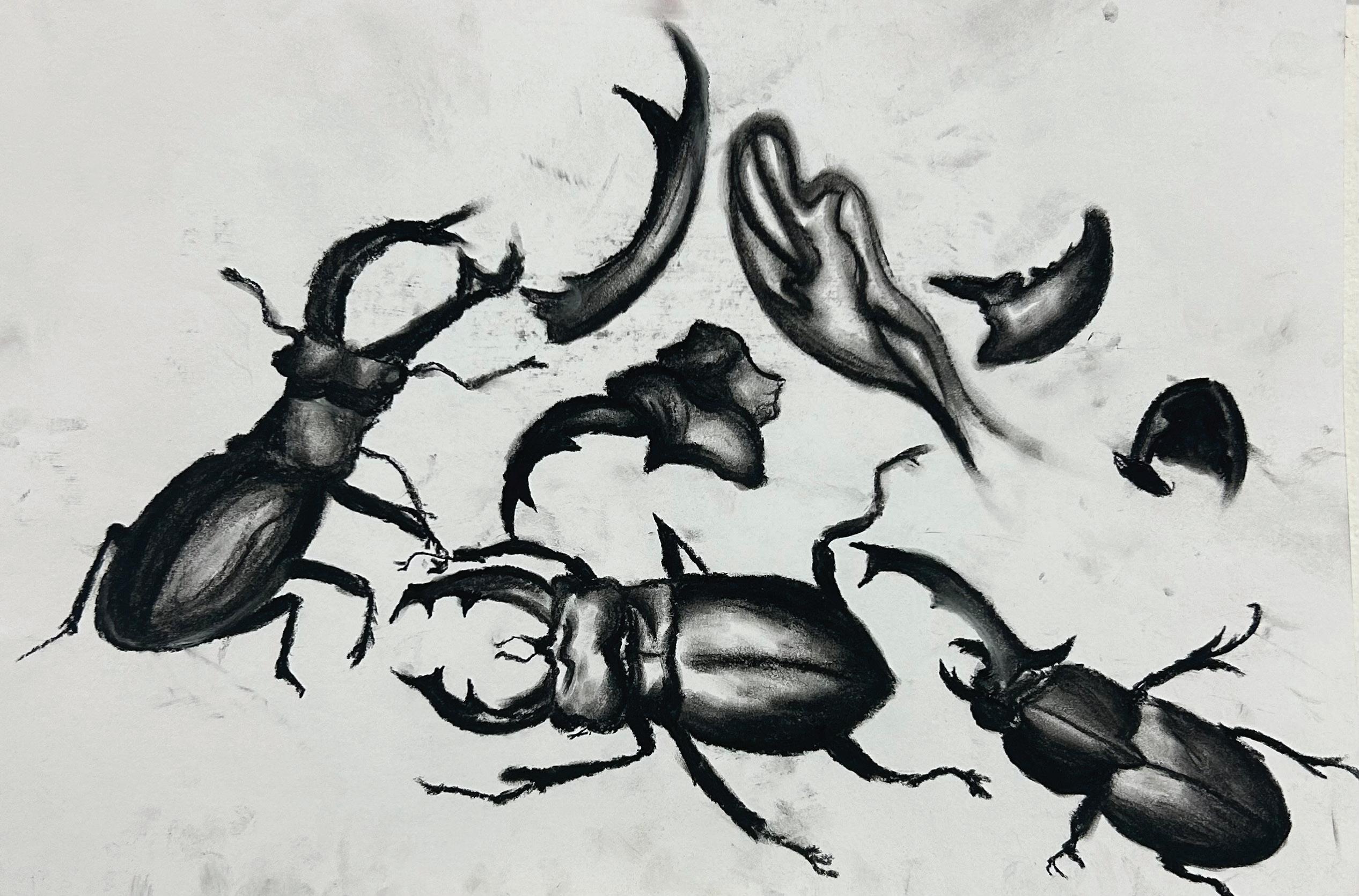
I am the leftovers by Mia Crowder & Juliette Zuñiga ’24
I am the cold pizza, the ice cream
The corn on the cob
The things in the fridge
That make your dog sob
The turkey the stuffing
The potatoes the ham
And all of the things
That make dinner so glam
So lovely to eat, but always forgotten I live in the corner and wait to be rotten.
Prodigy by Siri Atluri ’24
I’m 17 and I’m a witch I’m pruning up at the lips
I don’t have anything new to say anymore
I’m 17 past my prime fascinations then are now average crimes I can’t push past the benchmark for the best mediocrity’s a mess
I’m 17, I’m prime I don’t feel like my time is mine I’m 17 so why is the world unfolding to me when it promised it’d be mine I’m 17, in my prime blurred up in a screen of boxed blue-white limes, of pictures that might as well be polaroids with the nostalgia they carry, so that at least my tears would then wither fairies away that’s all I pray.
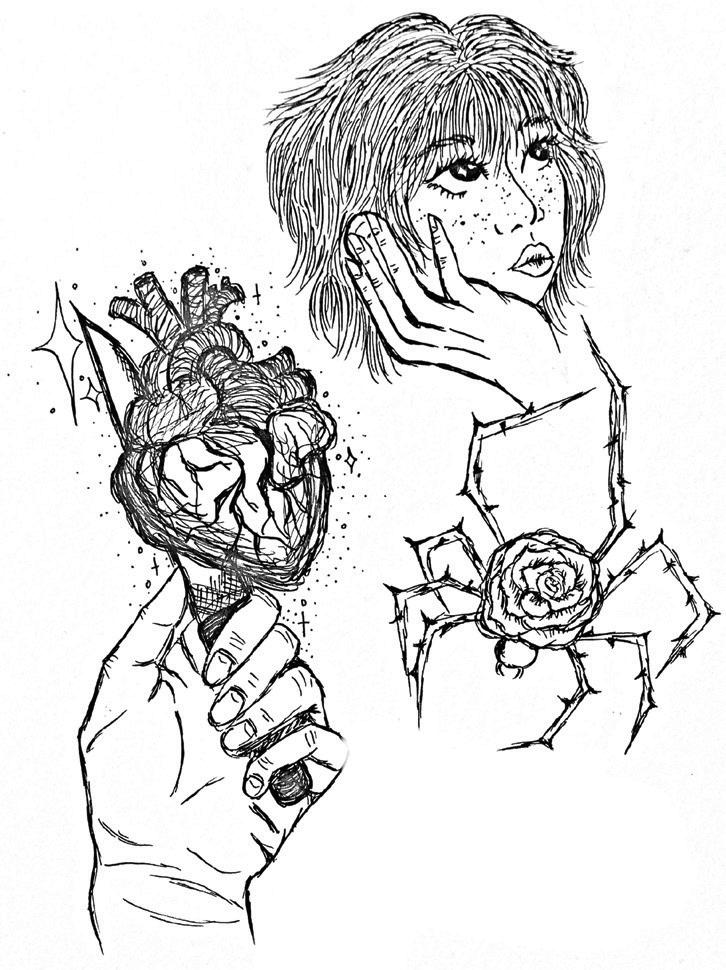
today
I’m stuck under a yellow lamp shade, got nothing new to say today
thorn by Katie Espinoza ’24 Brush pen
hollow sadness doesn’t feel prettier now that I’m away from where i thought it started and I thought it’d end now I’m in my palm-brimmed prime place for pretend.
What They Taught Her
by Nichelle Lindgren ’29
1ST
PLACE, MIDDLE SCHOOL SLAM POETRY CONTEST
What they taught her was that no matter what you do, it’s wrong
It’s like being given a bunch of jumbled musical notes but no specific song
You have to act tough in order to survive
Can’t show emotion or you won’t thrive
No way of knowing what can be accepted
But you should already know anyways otherwise you’ll be rejected
Choose the wrong thing and you’ll be judged or laughed at
Even small things put you in combat
Whether your family is different or the way you look is strange
People will look at you and think you should change
Whether your outfits and personality are quiet or loud
You can still hear the whispers coming from the crowd
Whether that crowd is family or friends
One imperfection is all it takes to take away all amends
In the past she had fear of all the things people had to say
She did everything that would push all bitterness out the way
She tried constantly walking on eggshells to avoid being the subject of somebody else’s group meeting
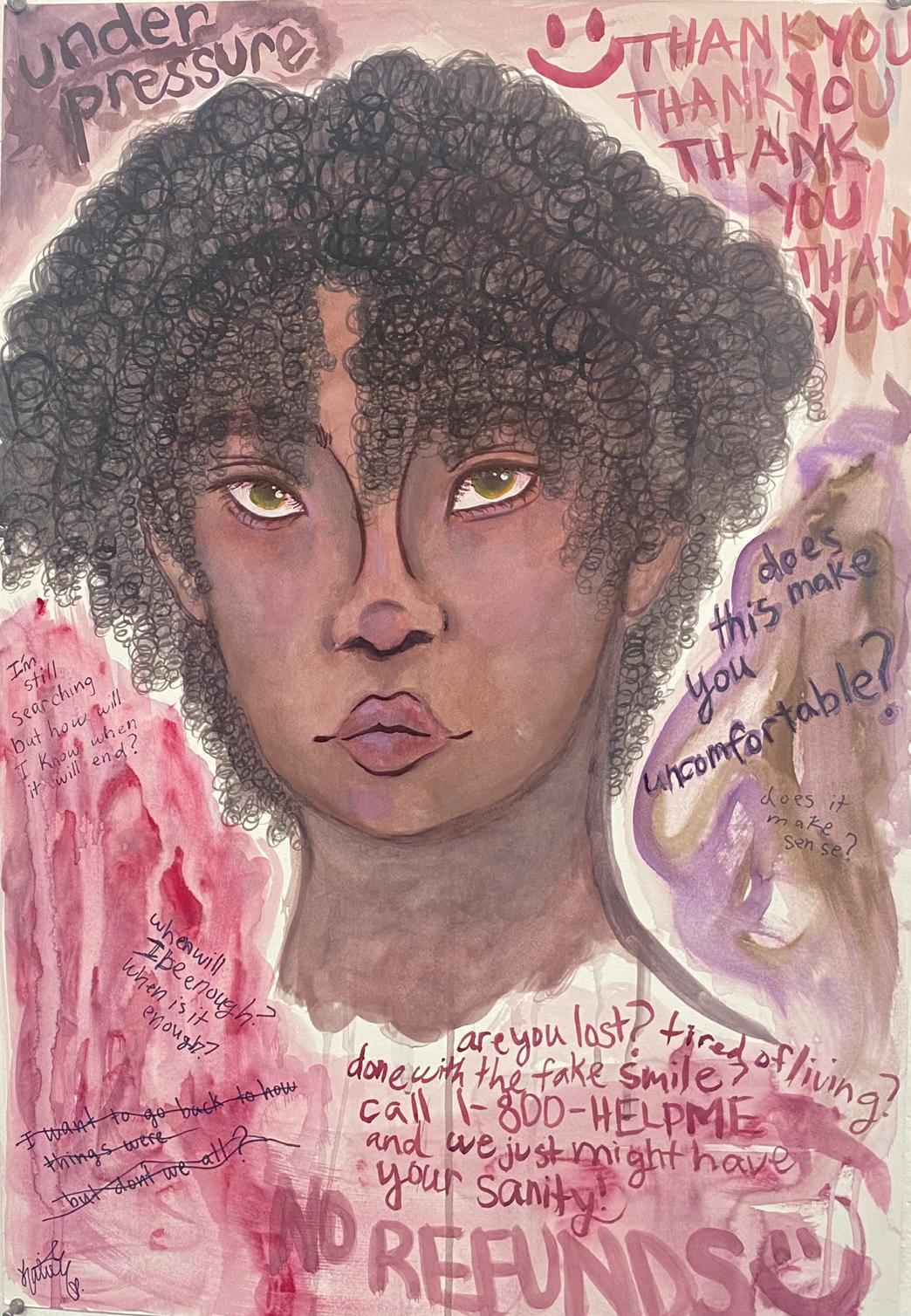
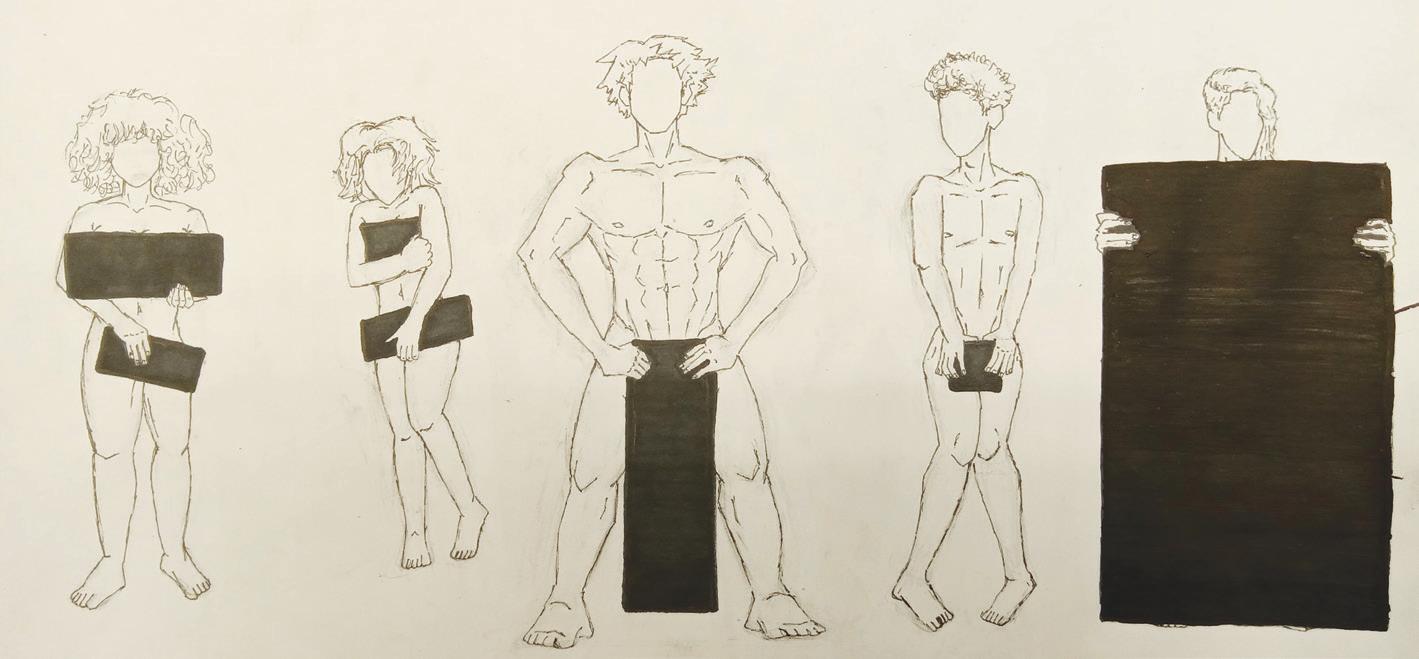
Questioning what’s right and what gets you a social beating
Although there was no way to win against the accusations and assumptions from people who didn’t even know her or her story
Can’t win against anything in the world if you try to chase for glory
Yet again and again she tried feeling the stab of each time she questioned if she even mattered
Ripped herself to bits and pieces until she spent her nights completely tattered
Wouldn’t be until the longest time that she looked at it with a different angle
Why did she have to put herself in constant strangle
Who cared if the world could never be impressed
The way she was should have never been repressed
She loved and valued every emotion she had
No matter the amount of people who told her they were stupid and bad
From her outfits and personality she slowly appreciated who she was through and through
For some things they taught to her were in some way true
Like how no matter what you do people will say it’s wrong and will treat you like an animal in the zoo
But they didn't define her
They don’t define her
Yes, that was the one good thing they laid in her mind to whirl and stir
What they taught her that was for sure
under pressure by Katie Espinoza ’24 Watercolor
Censorship by Imani Cochran ’24
Pencil and ink pen
Paris by Hayley Clark ’27
Said you’re living on the other side of it all
Jumped right to another side of the wall
And I wish the grass wasn’t really greener
So you’ll just come home for the holidays
Brace yourself for the heat of the blaze
Tell me how much better your life is
Even if it’s without me
It’s all ponds and parks and pastries
But you can keep your baggage somewhere else
And it's not my problem anymore
The panic only stopped when I was sitting by the lake
Toy boats and yellow birds and everything’s so cliché
And it was almost a perfect day
And it’s all just one giant disgrace
They said Paris was a perfect place
And the pessimist inside me
Didn’t want to believe it
And I’m never going to cry
For some place so overrated
And you don’t know how badly
I wanted to hate it
It doesn’t matter anymore
Getting on the plane
I’ll be gone sometime
It’s not you to blame
I’m not waiting here
Sitting on the floor
And I’m not a problem
Anymore
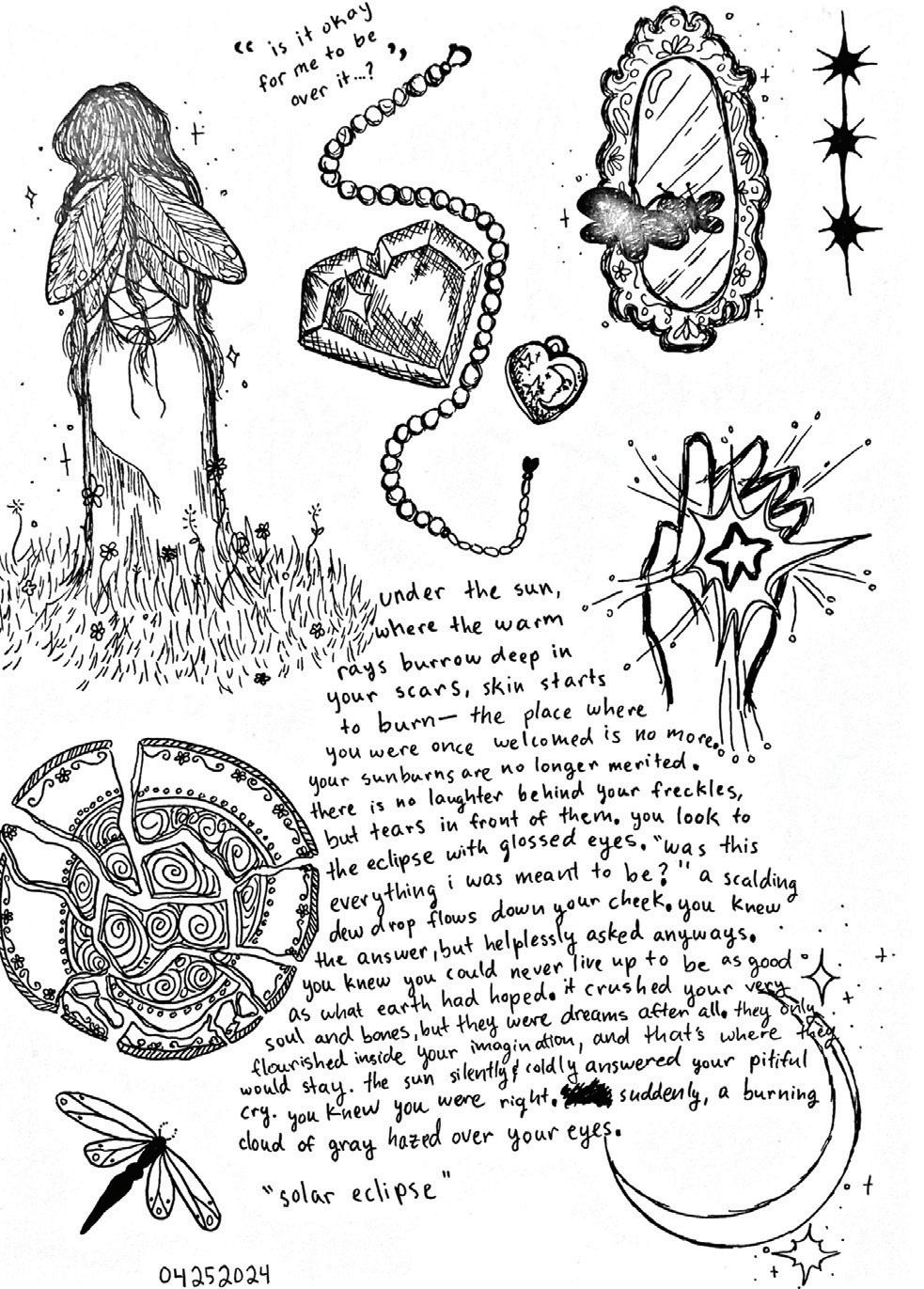
the powdered chrysanthemum
by Siri Atluri ’24
You tell me I am a chrysanthemum destined to grow towards starlight and in this way, you are worrying.
A beautiful lie is still a deception.
Kiss my dew dropped eyelashes with your pretty words, like snow white’s prince.
In a couple years time when blood red lips match jowled cheeks you may pray on death, come to me as a dream where a forgotten wish is never a great sorrow.
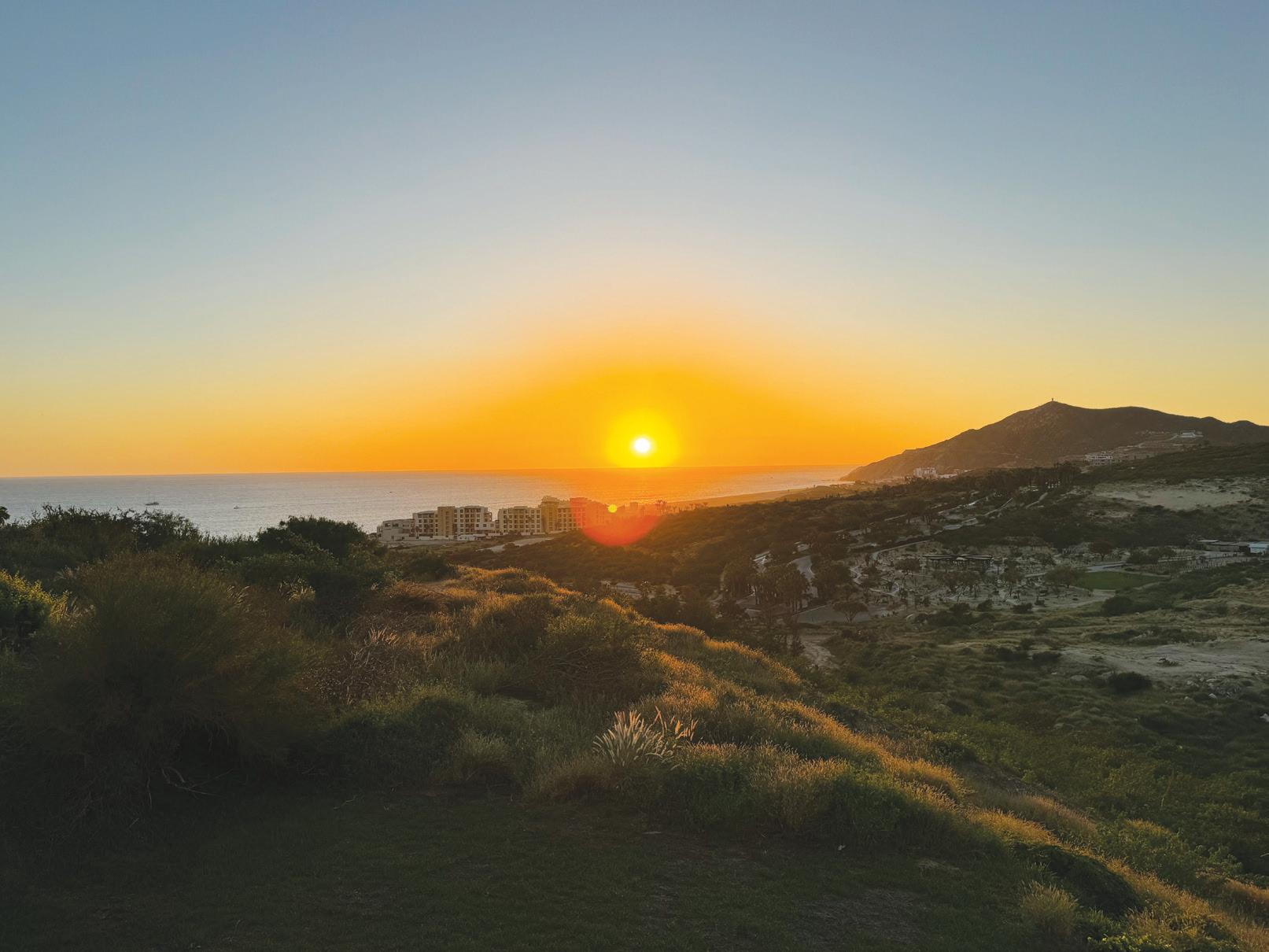
solar eclipse by Katie Espinoza ’24 Brush pen
Artist Sp otlight
“One of the main reasons why I think creating art is so much fun is because I get to capture exactly what a moment or a feeling is to me in the exact way that I want, with complete creative freedom.”
Step inside Katie Espinoza’s abstract, dreamlike paintings and find yourself surrounded by whimsical swirls, vibrant pastels, and repeating organic motifs.
Espinoza draws inspiration from a variety of sources, including Studio Ghibli films, music videos, collages, graffiti, and literature. For her, art is about exploring “vibrancy through striking visual components and color,” as well as an expression of “the whole spectrum of emotions.”
She says, “One of the main reasons why I think creating art is so much fun is because I get to capture exactly what a moment or a feeling is to me in the exact way that I want, with complete creative freedom.” This sense of intimacy allows Espinoza to explore her innermost thoughts through her art, including her doubts and insecurities.
Like her art, Espinoza’s creative process is a blend of structure and spontaneity. First, she searches online for inspiration and curates a digital palette of the colors she’d like to use. Then, she mixes paint to create her desired shades, puts on music “that channels the tone and emotion of the piece,” and finally slips into her “reckless and spontaneous painting alter ego.”
In Dreamer's Spectacle, look for: The 17 different phrases painted throughout Dreamer’s Spectacle. As Espinoza puts it, locating all the phrases is like “a little Easter egg hunt.” Can you find them all?
However, for Dreamer’s Spectacle, this year’s Glass Knife cover piece, Espinoza had to plan more carefully. The painting was commissioned by Sacramento Country Day School’s high school principal, who asked Espinoza to create a piece centered on the theme of respect.
Espinoza says, “The fact that the painting was a commission really made
me step out of my comfort zone.” She searched for inspiration on different lettering styles, collected a variety of quotes on the theme (including from discussions in English class), and challenged herself to render “real objects” such as stars and eyes. The finished product stands over 36 inches tall and 24 inches wide and is now on display in the high school office.
Katie Espinoza ’24
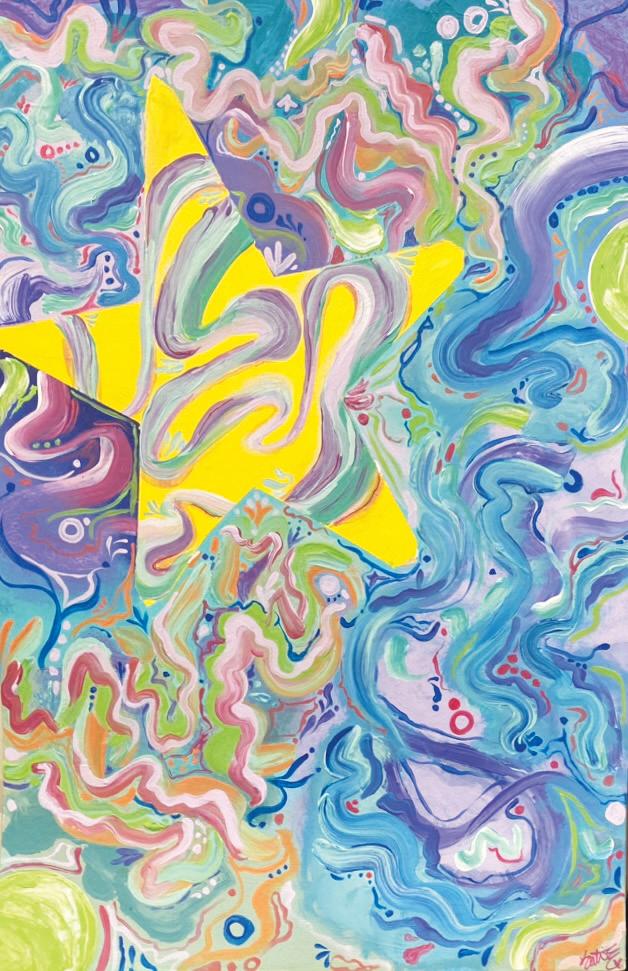
Lavender Radiance by
Acrylic
Night
by Matthew Inman ’27
Dark dusty slow
The sky endlessly in the throws
Clouds against stars and light
All through the night
A cricket brings the heed
Night comes with great speed
Pushing the light away
But the dusk must pay
Because only hours soon
The light beats the moon
The war begins again
Yet it will never end
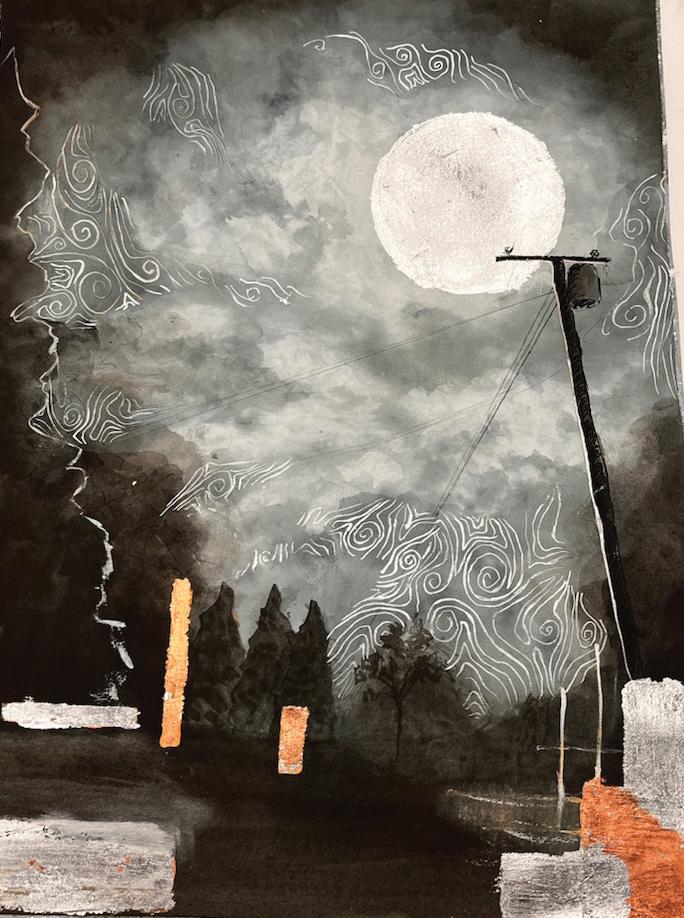
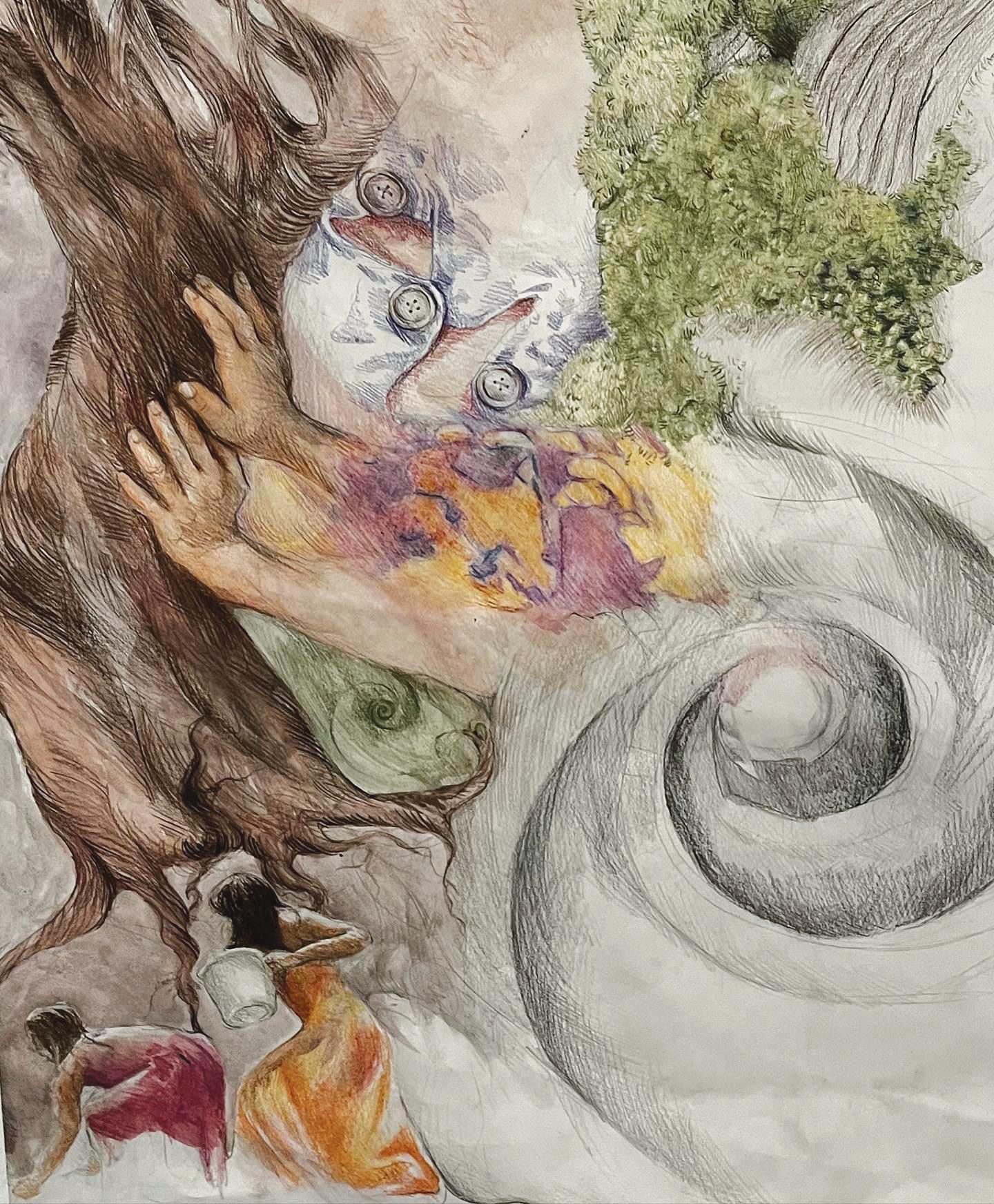
Moonlight Mist by Gavin Wang ’26
Gold & silver leaf, ink, and watercolor
New Growth by Claire Gemmell ’26 Colored pencil
The Breaking Banquet
by Isaac Reynen ’26
In times of old When I was new And creatures feared my roar When waves trembled with my might And broke from shore to shore I ate in vain and gluttony And failed to wonder why it was That I should have such power If not than just because For my teeth were sharp And gleamed Whenever I took a breath
And to all it had seemed That I was nought but death Yet now as I lie here In the spoils of my wrath With treasures and the bounty
Of those who blocked my path
I am left to wonder dying In my forgotten might and bliss If the end comes for us all Does it all come to this?
The strength and luster of the past
Replaced with sorrow and woe
For the lack of those features That brought fear from head to toe
To be banquet of the earth On whom all it feasts and dines And since my very birth I have nought but bought me time For in the end we all Shall die as I am now
To our mistress mother Earth In the end we yield and bow
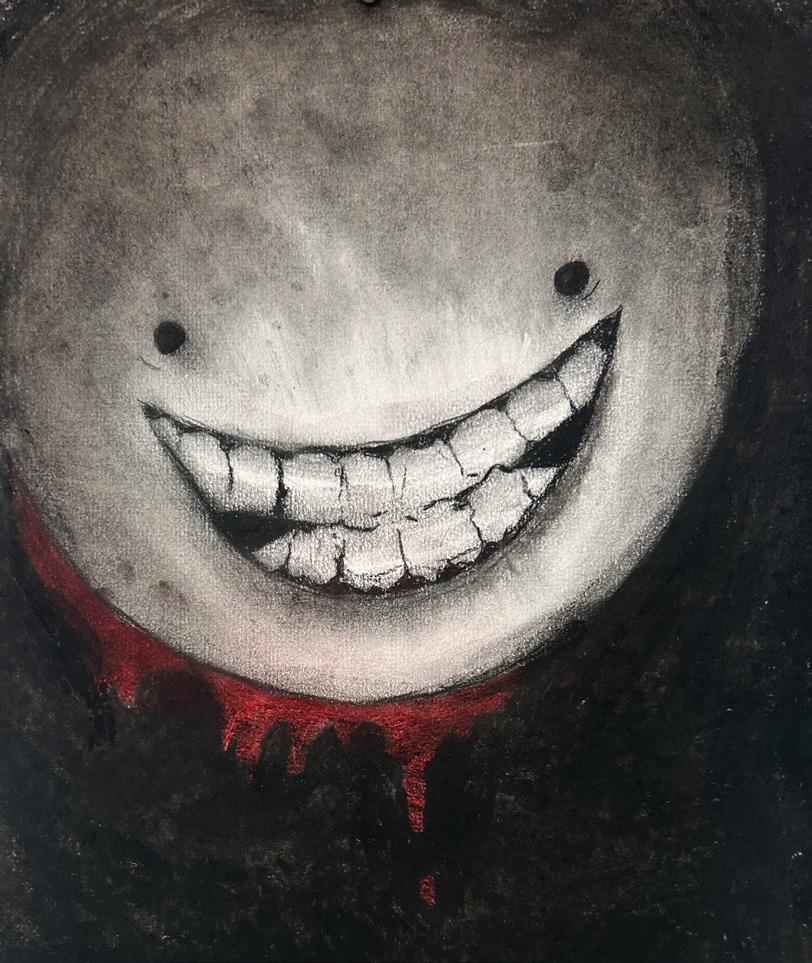
The Glass Knife Staff 2023-24
Literary Editor, Design Editor & Social Media Manager: Lauren Lu
Managing Editor & Staff Writer: Grace Zhao
Production Editor & Staff Writer: Siri Atluri
Art Editor: Claire Gemmell
Assistant Literary Editor: Zema Nasirov
Assistant Managing Editor: Jordyn LaPlaca
Assistant Art Editor & Editorial Assistant: Annabelle Do
Copy Editor & Staff Photographer: Anika Nadgauda
Staff Artists: Hayley Clark, Mia Crowder & Ava Levermore
Staff: Nolan Wilson
The Moon smiles back by Graycen MacNeill ’26 Charcoal and chalk on cardstock
Acknowledgements
The production of this 13th edition of The Glass Knife was centered around sonder. It’s entirely becuase of the artists and writers who’ve submitted to us that we are able to present this year’s volume. We’d like to thank the high school teachers for granting extra credit for submissions, and especially Mr. Cunningham for his help in finding additional pieces for publication. Thank you to Nichelle Lindgren, winner of the middle school’s poetry slam contest, for graciously allowing us to print your work. Finally, as always, Mrs. Strong, this edition would not be here without you. We’re so grateful for your patience and your support.
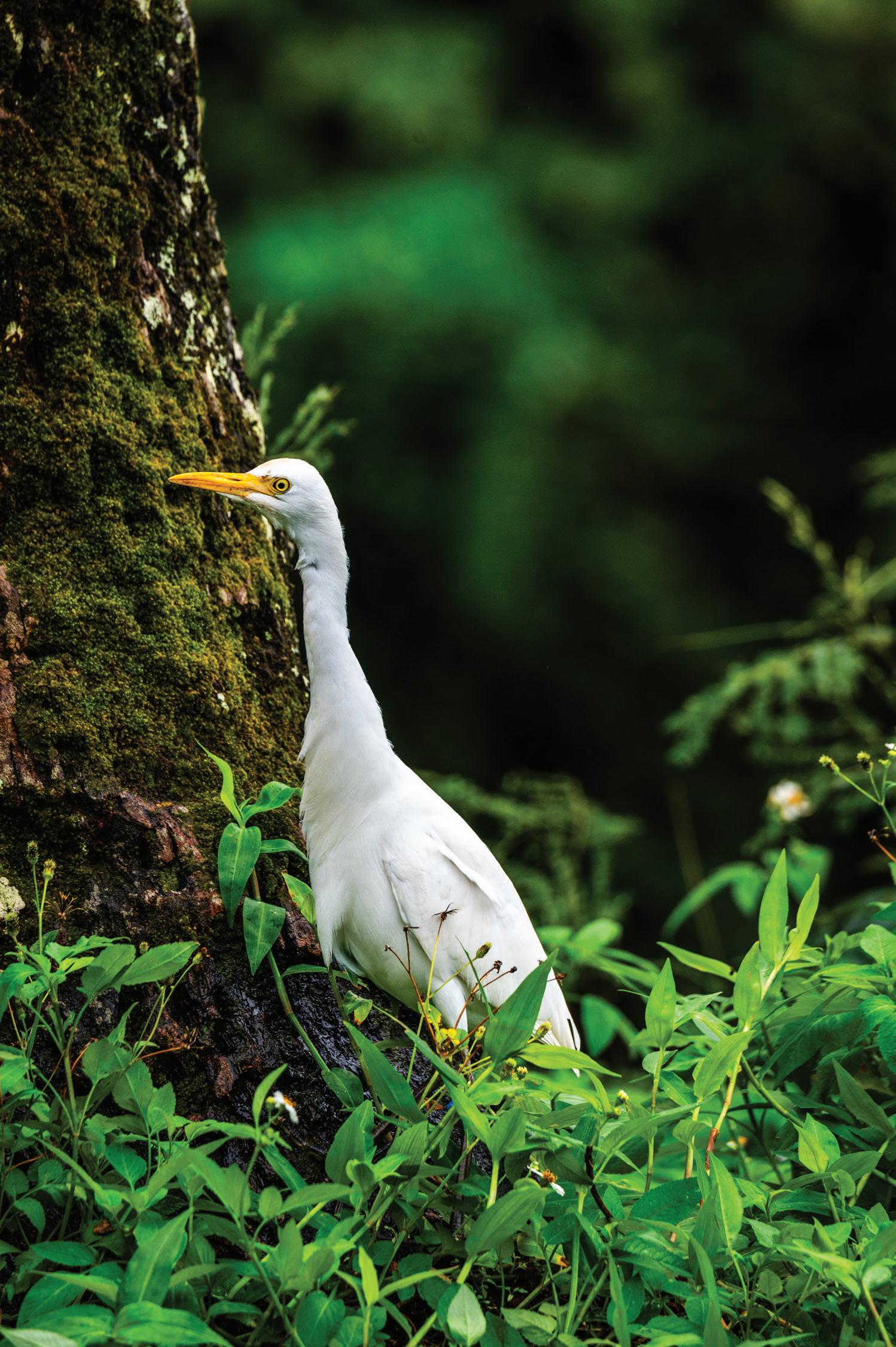
Egret in the Forest by Simon Lindenau
